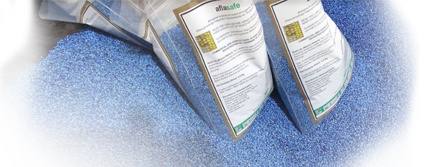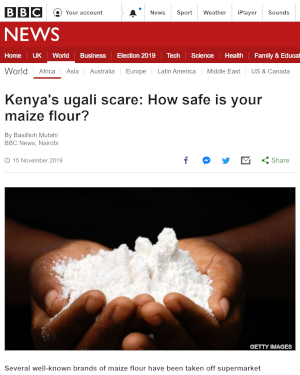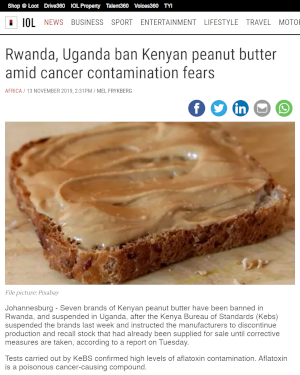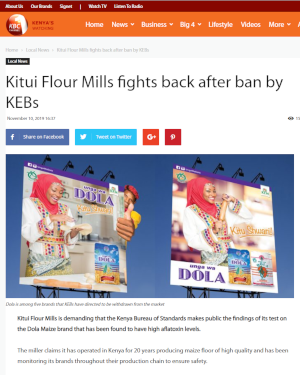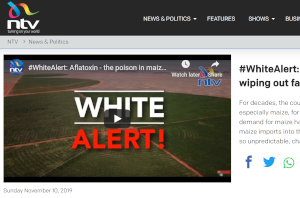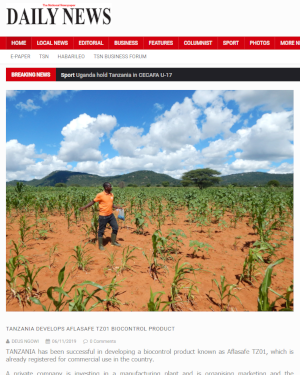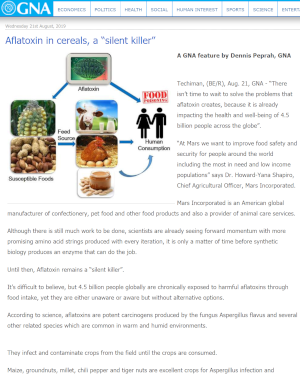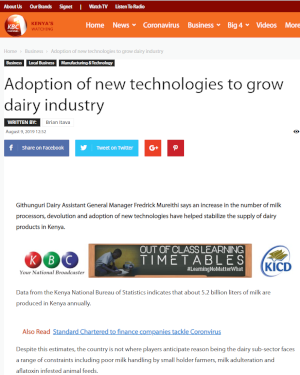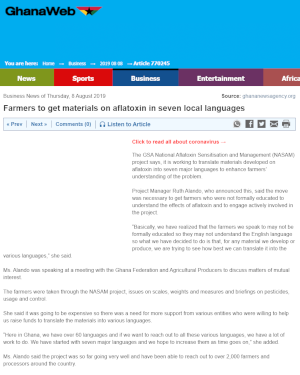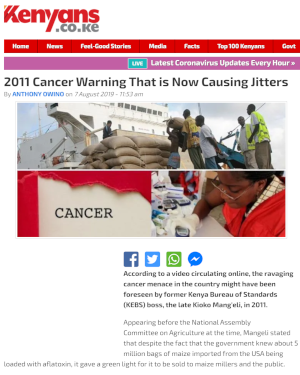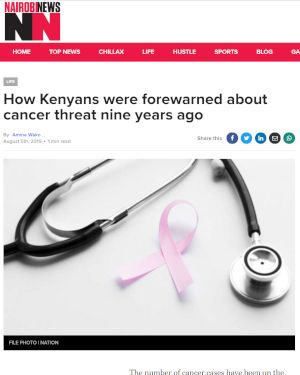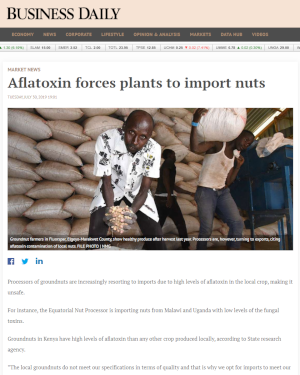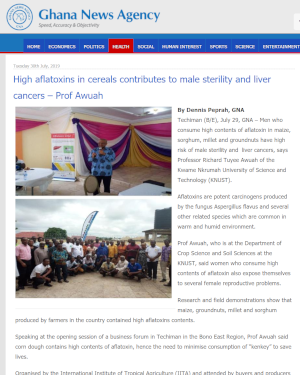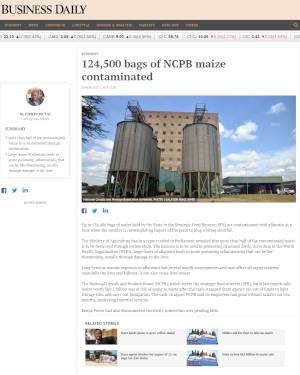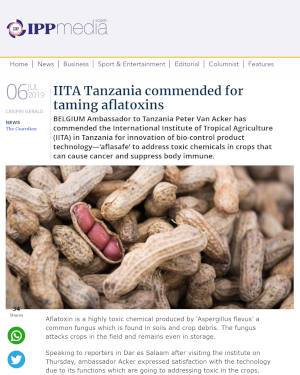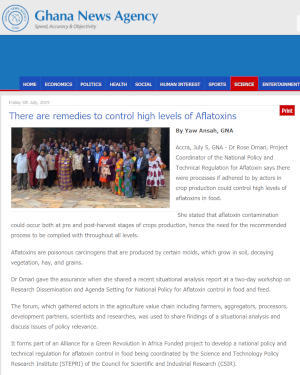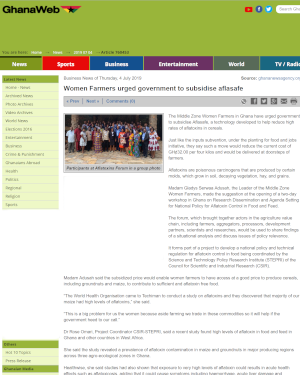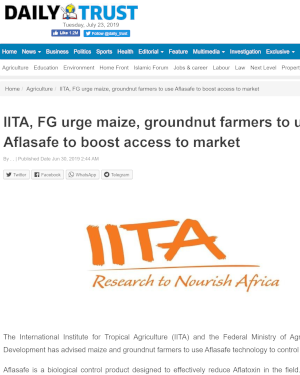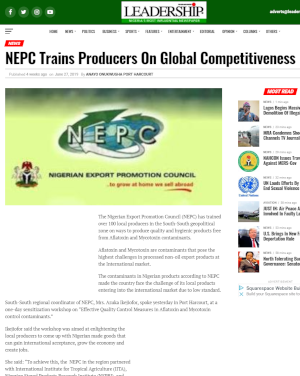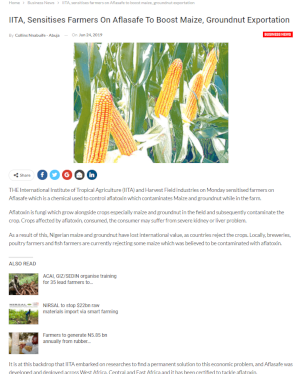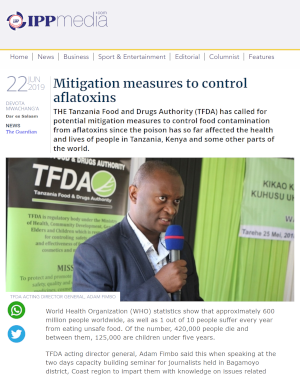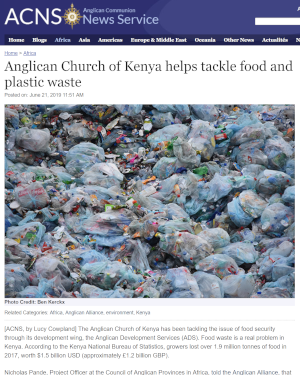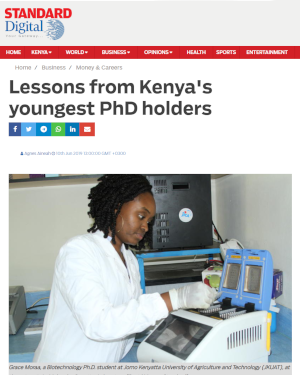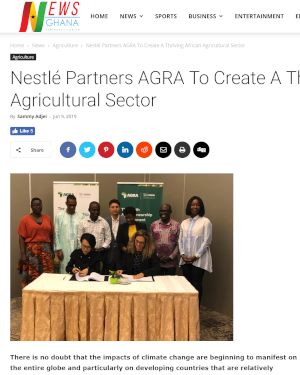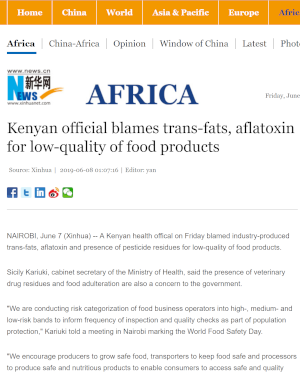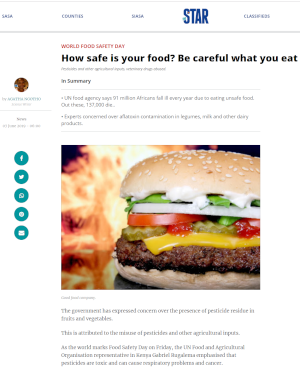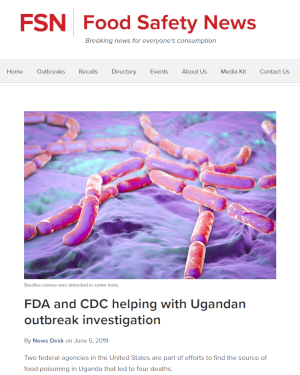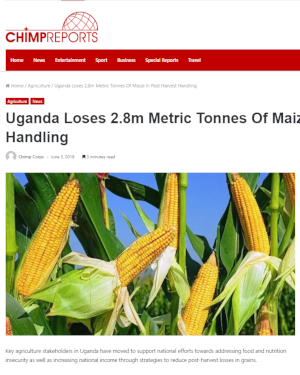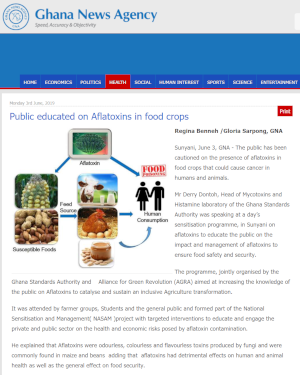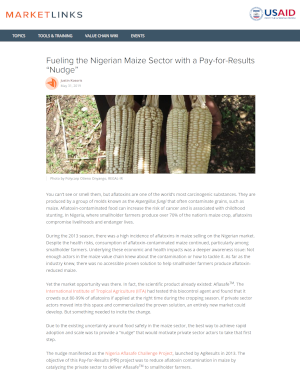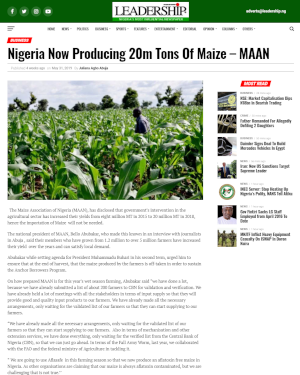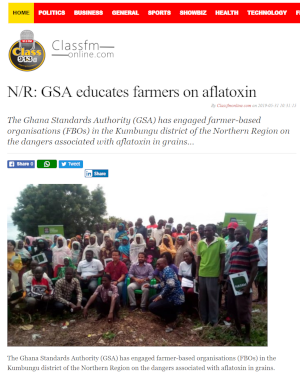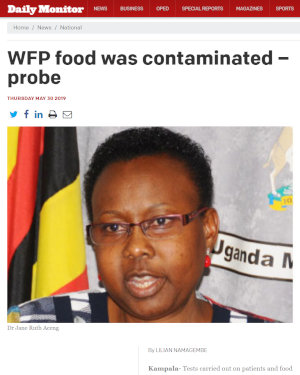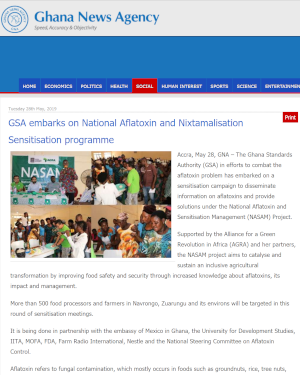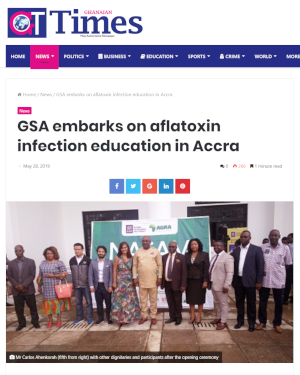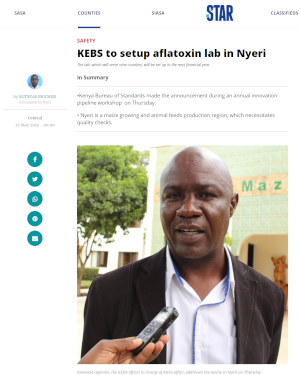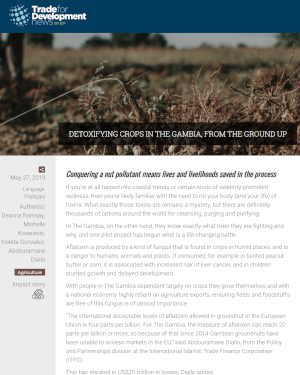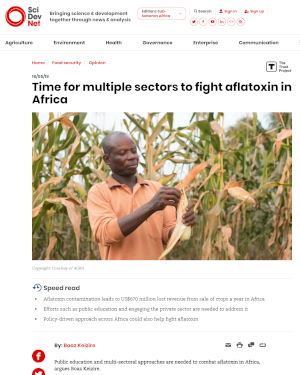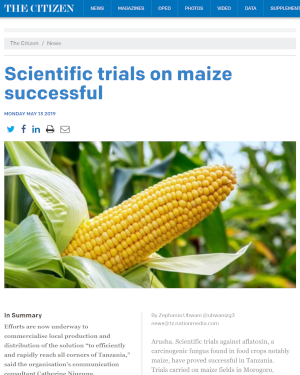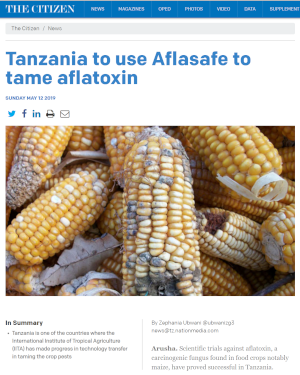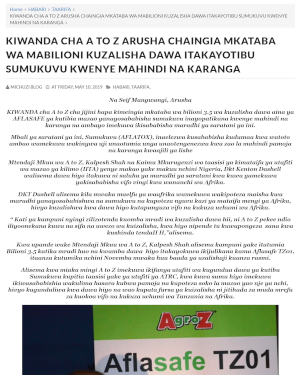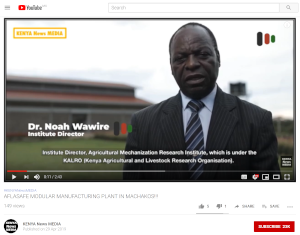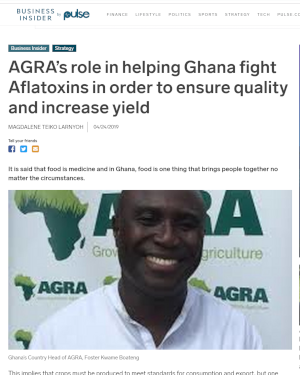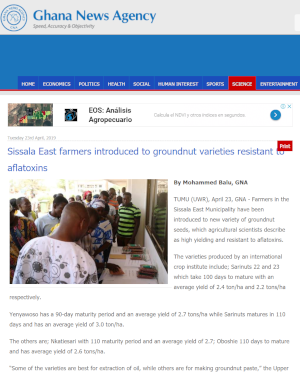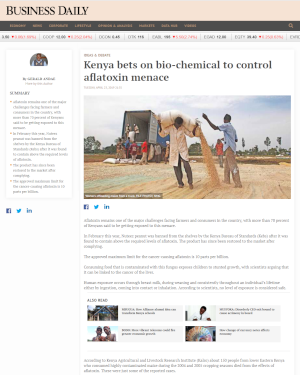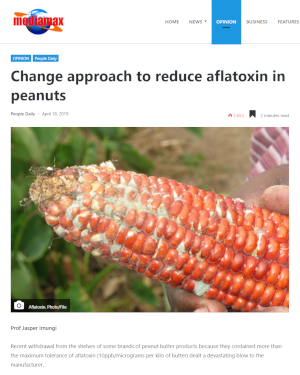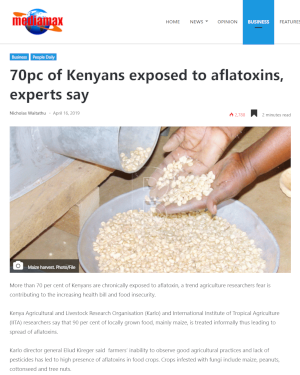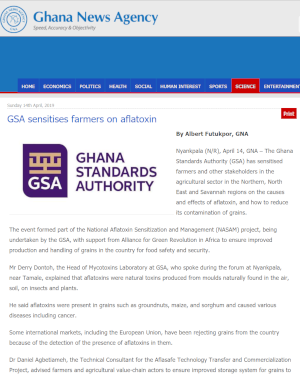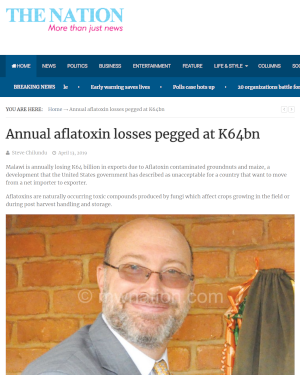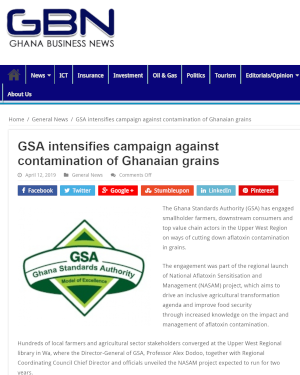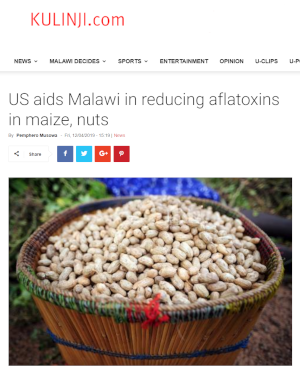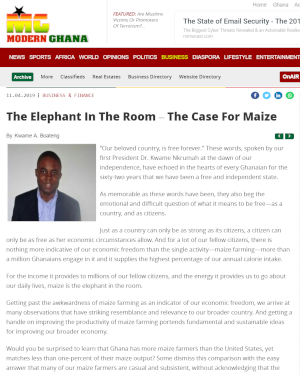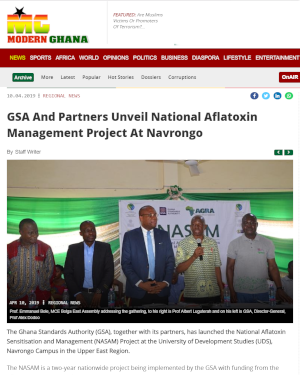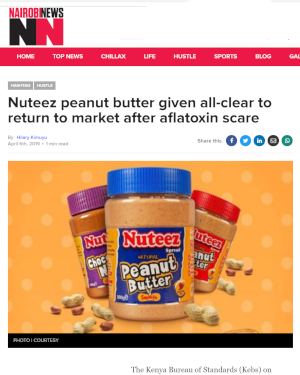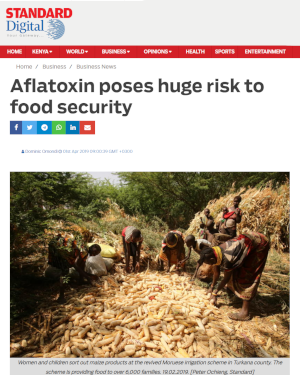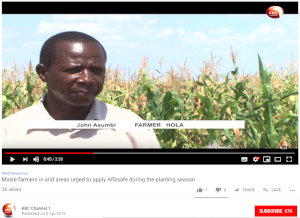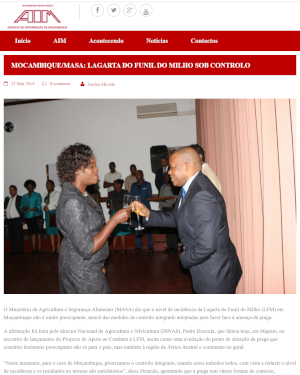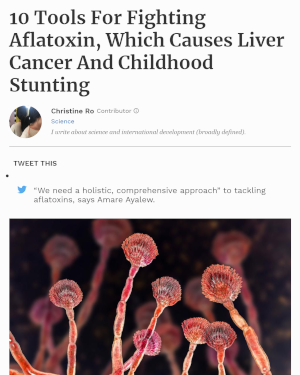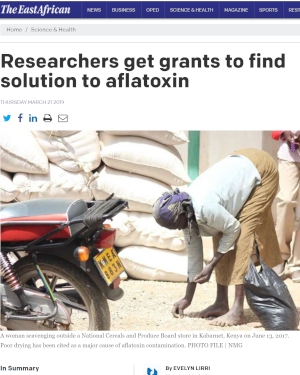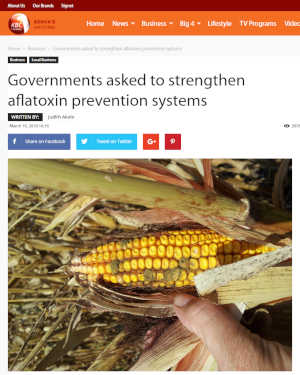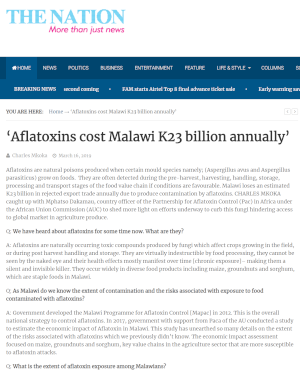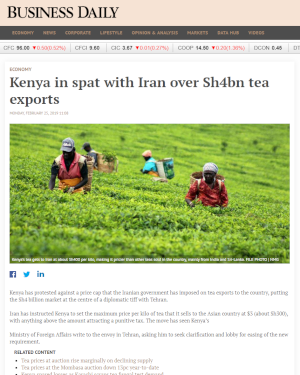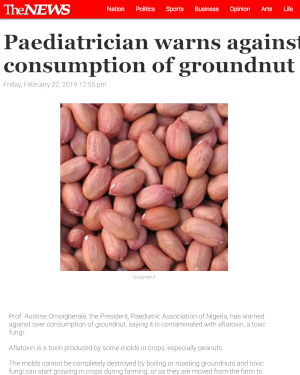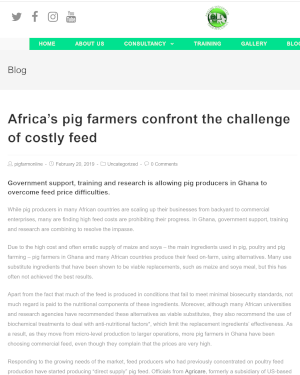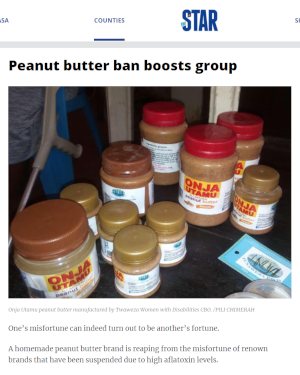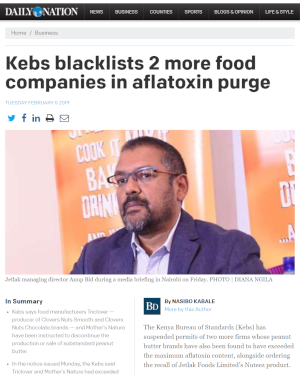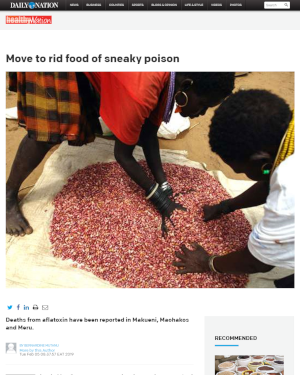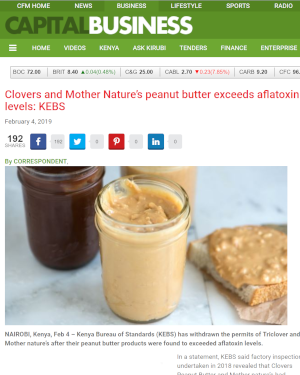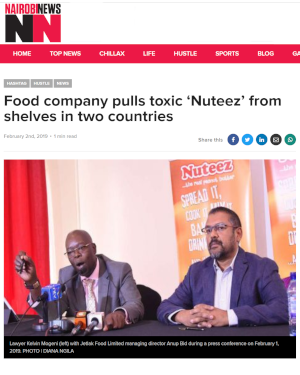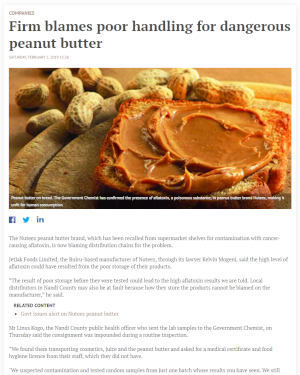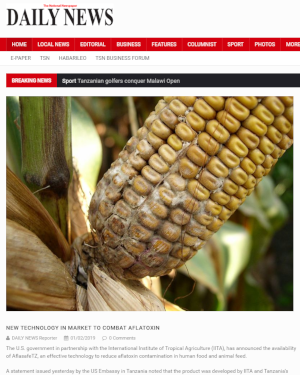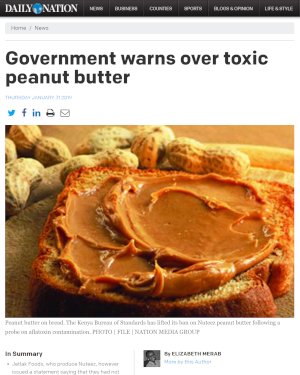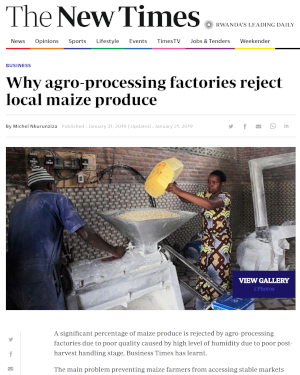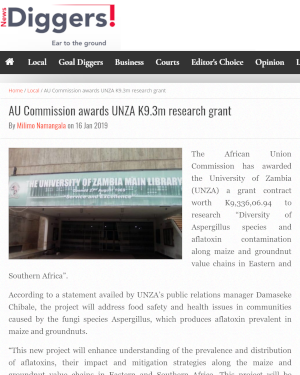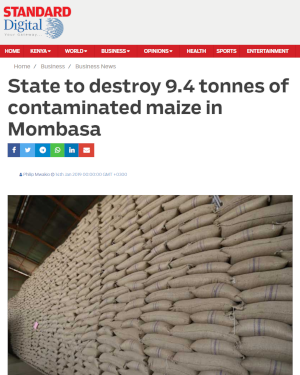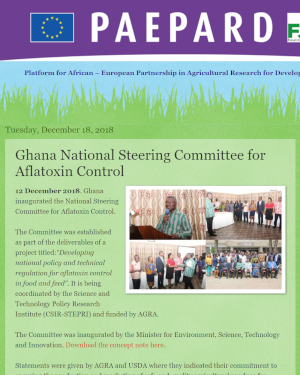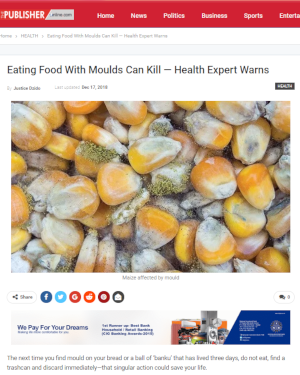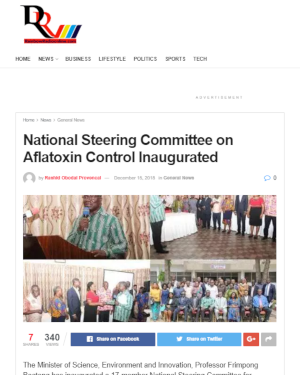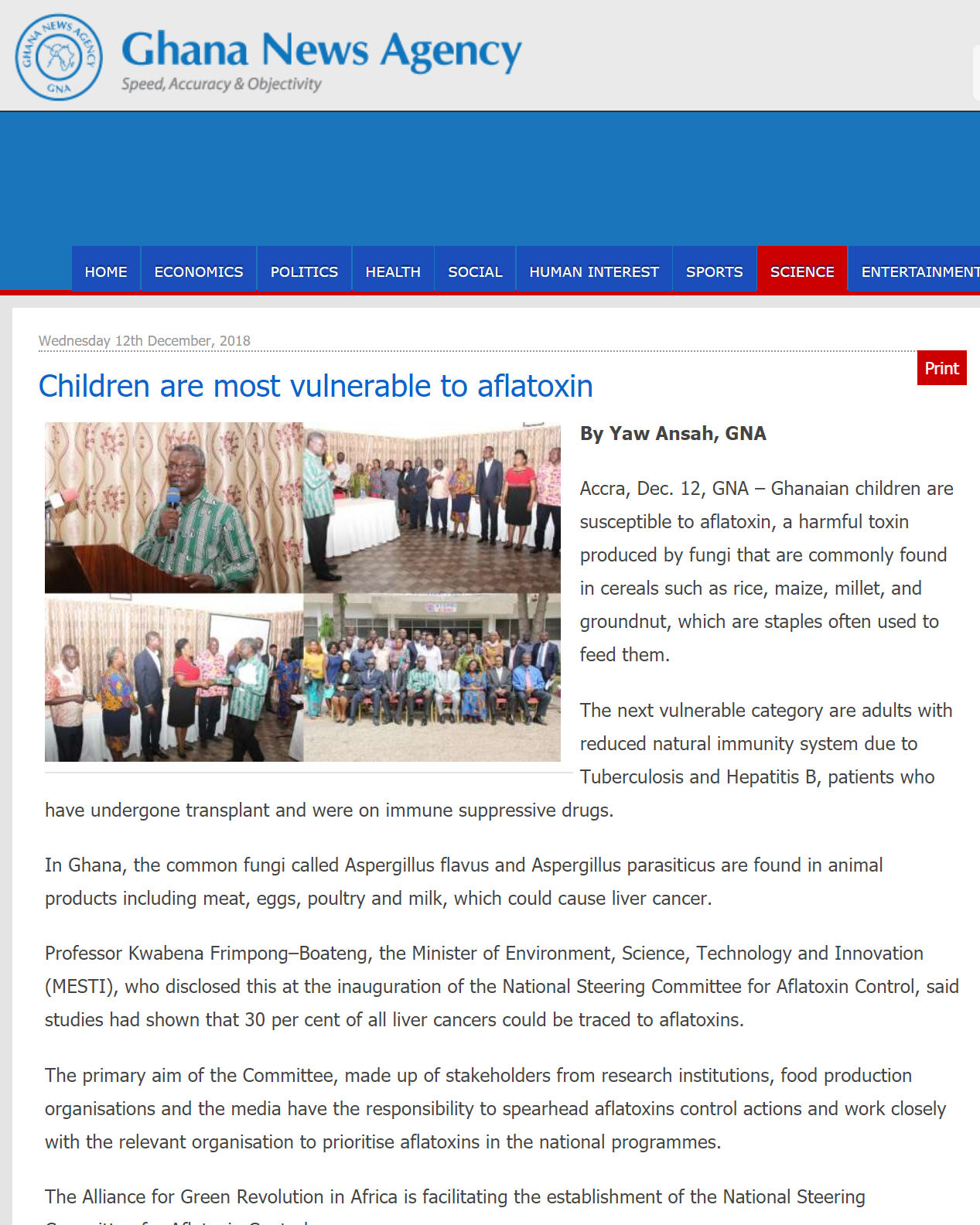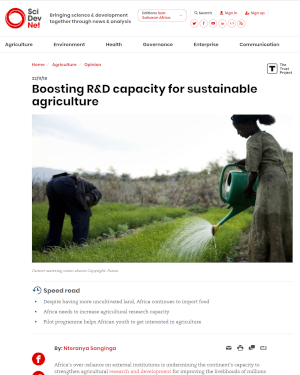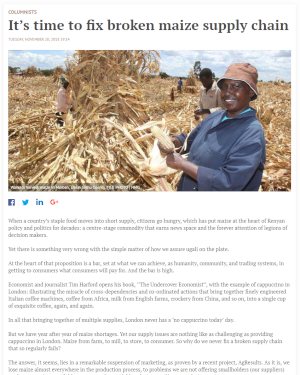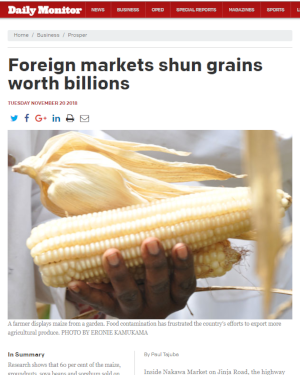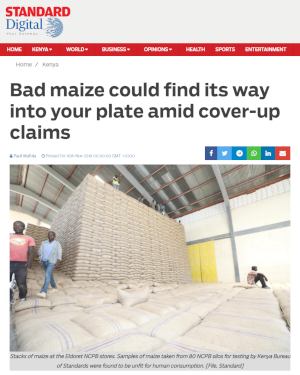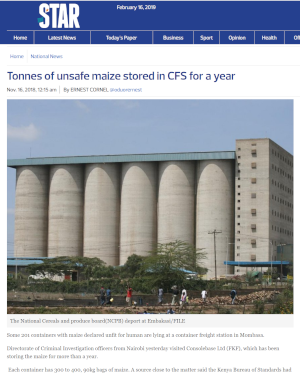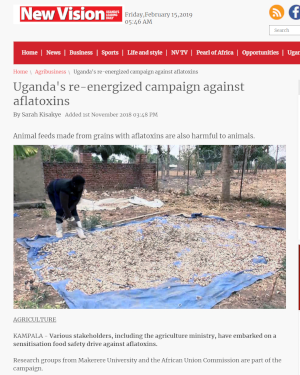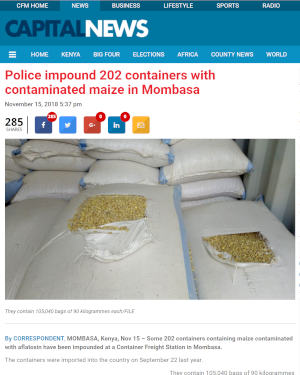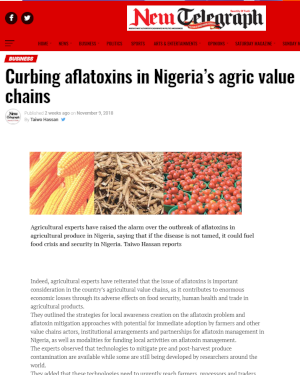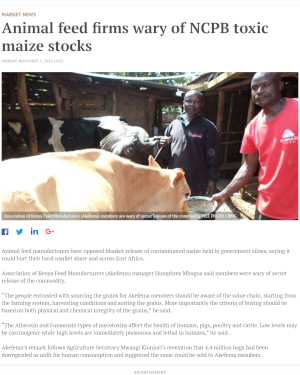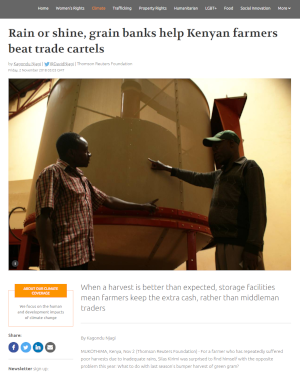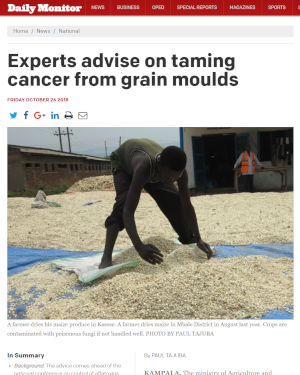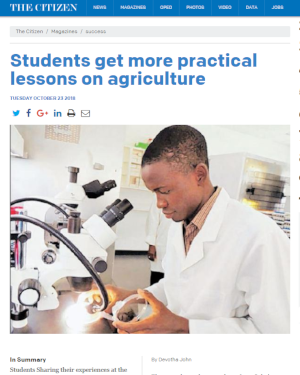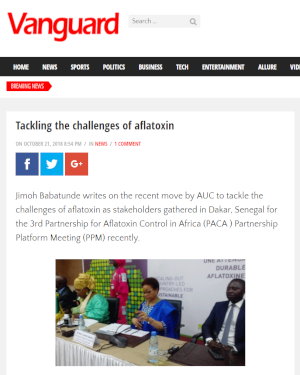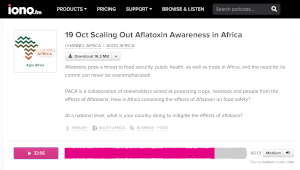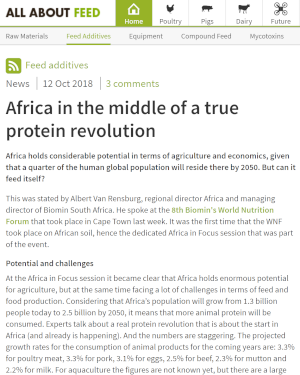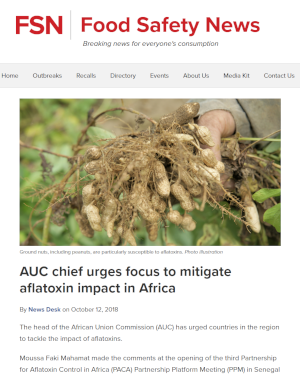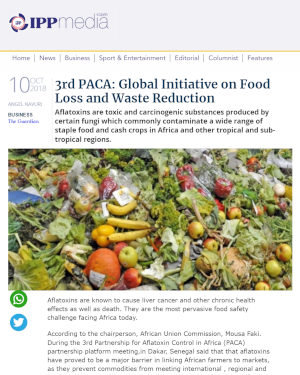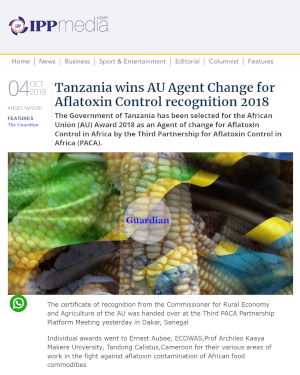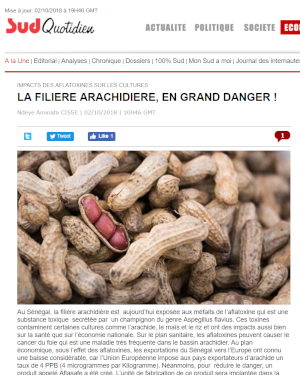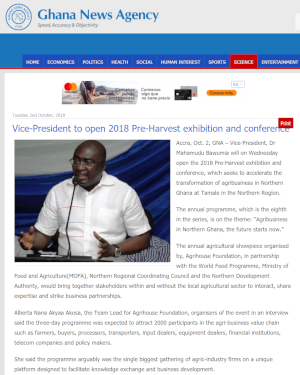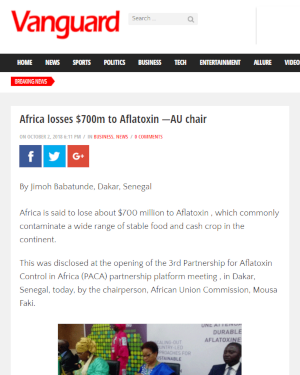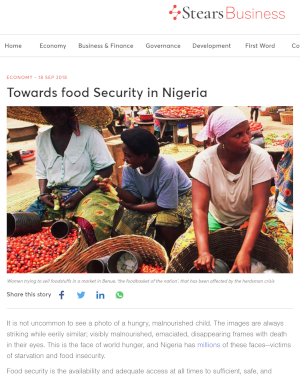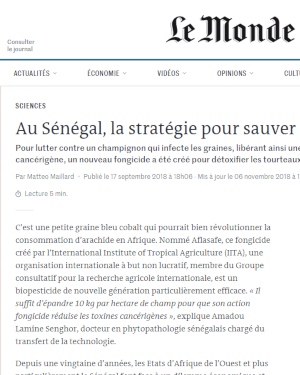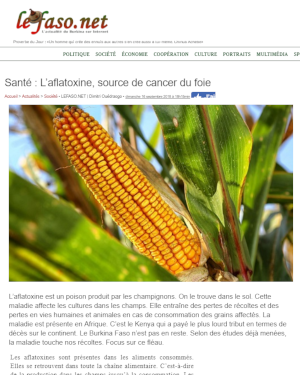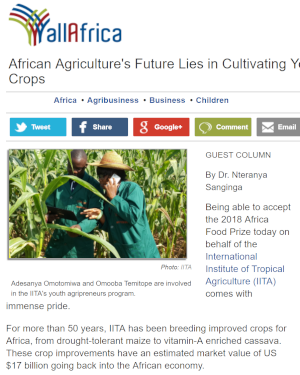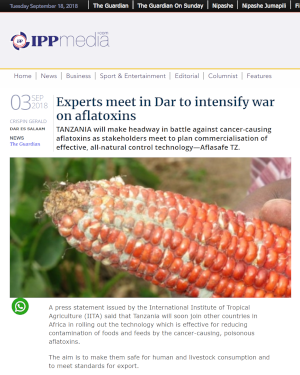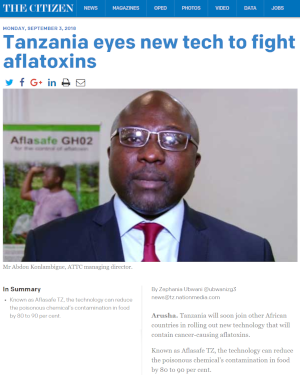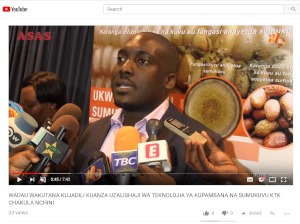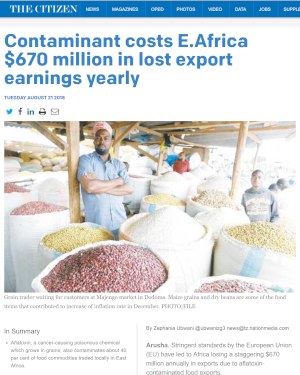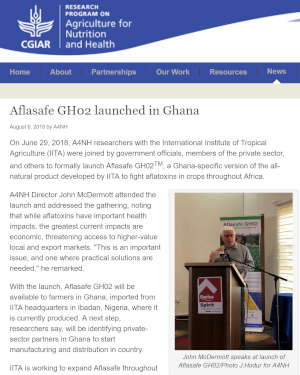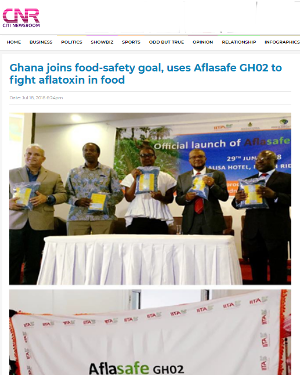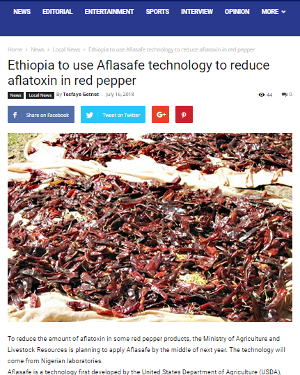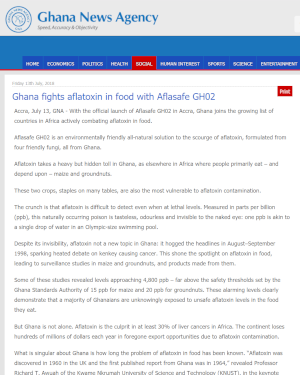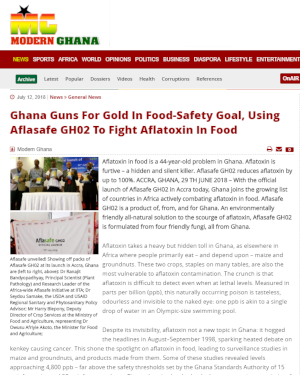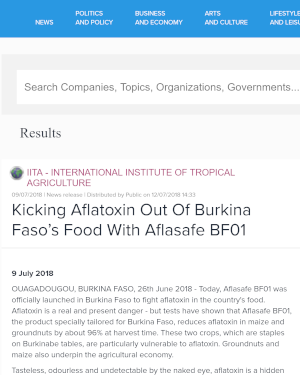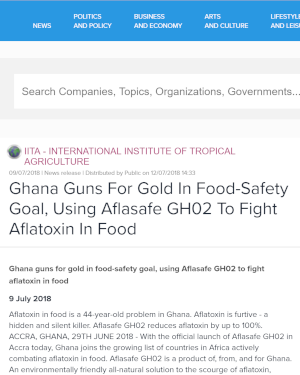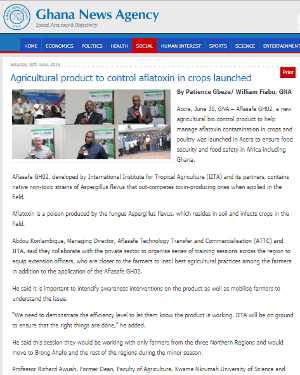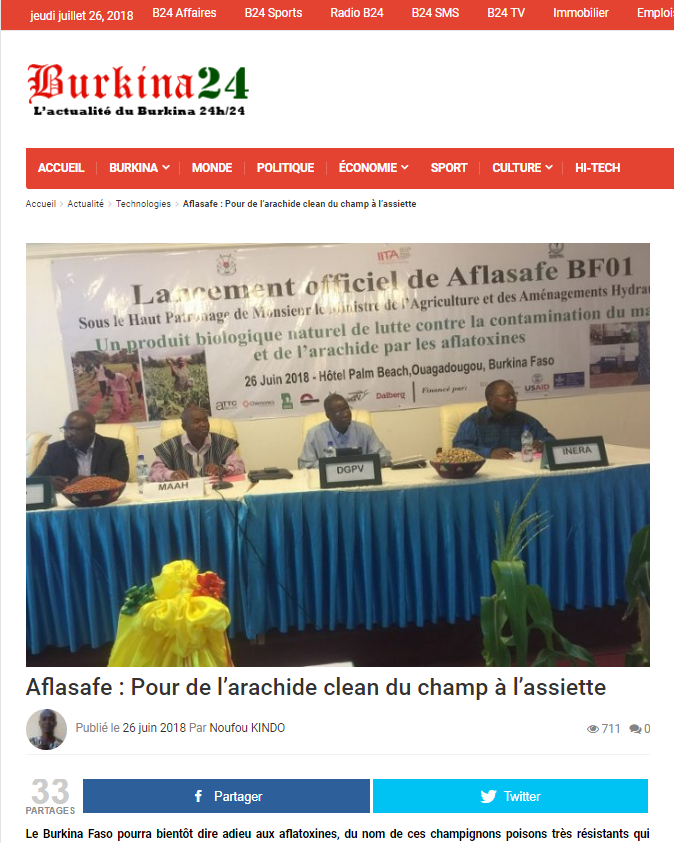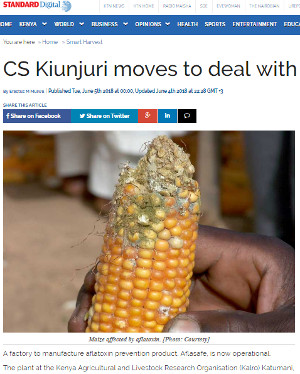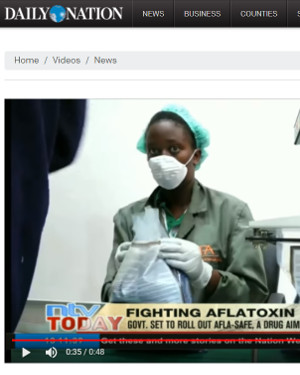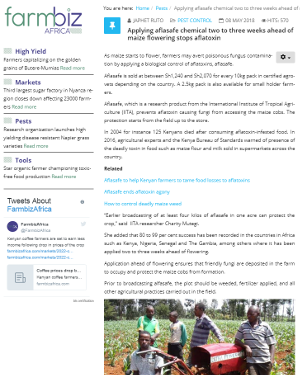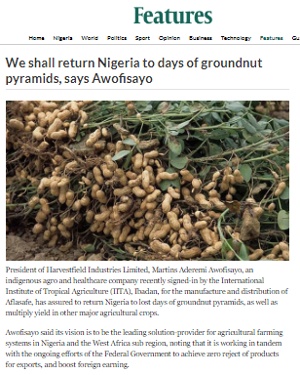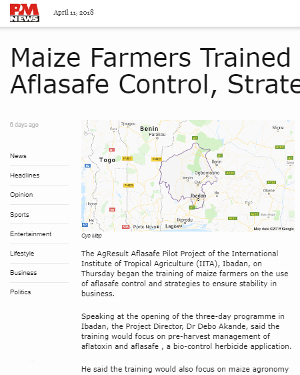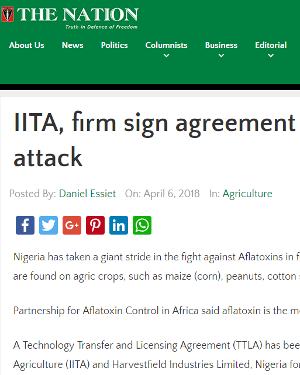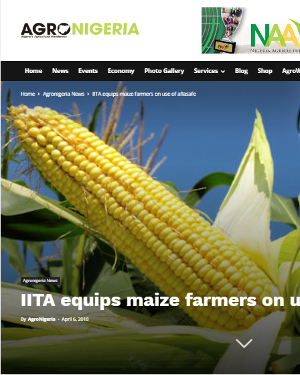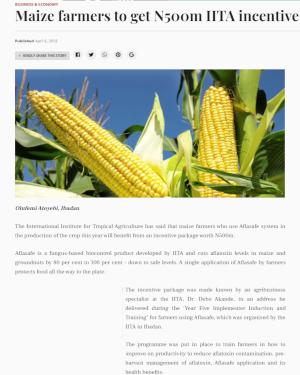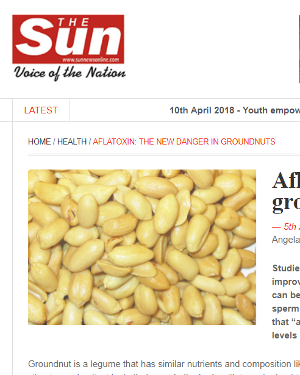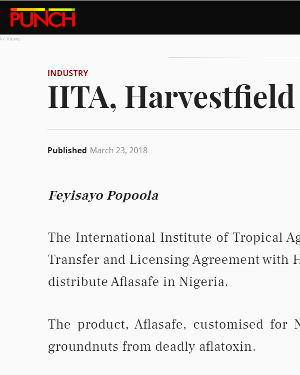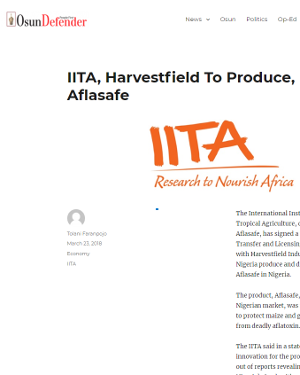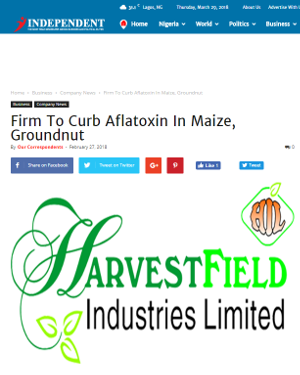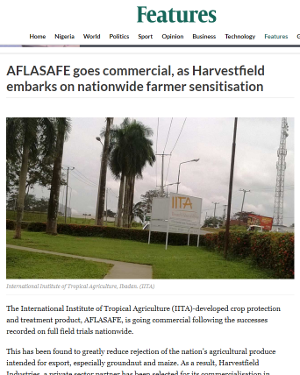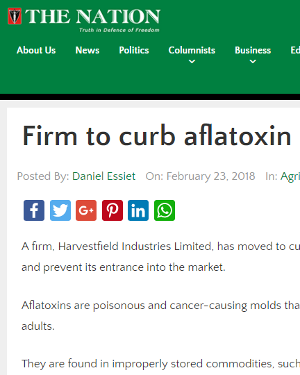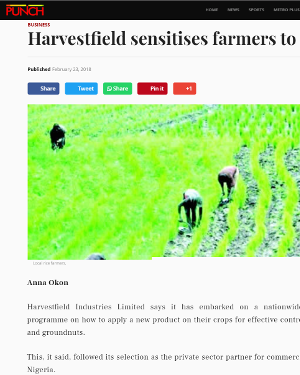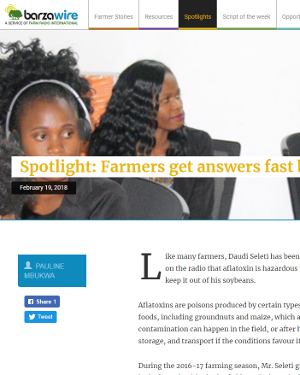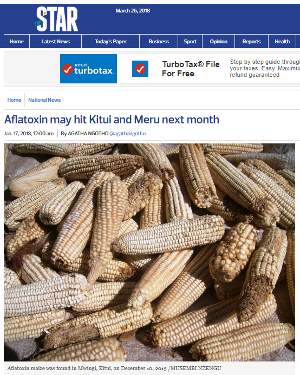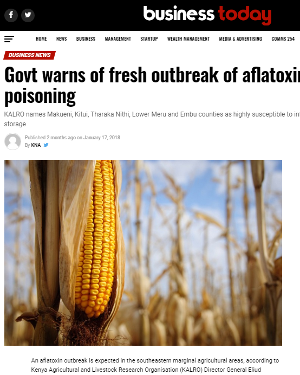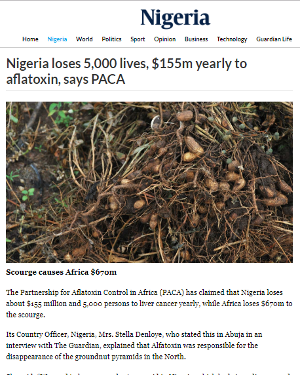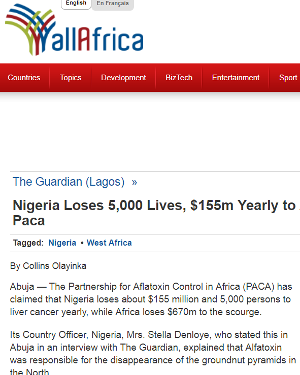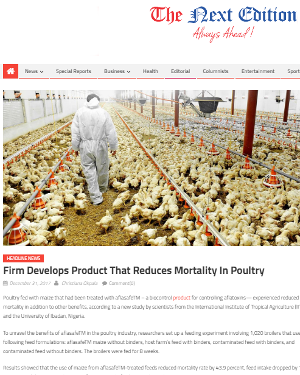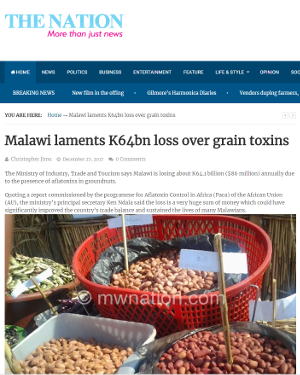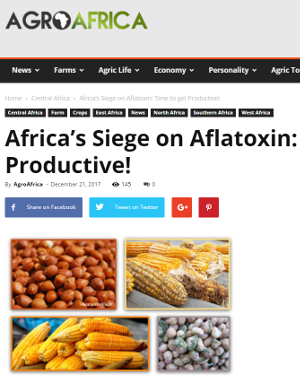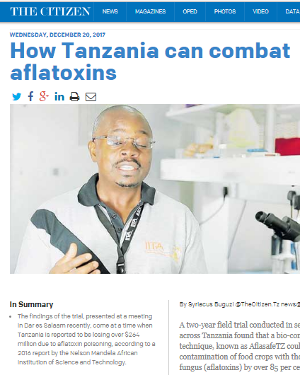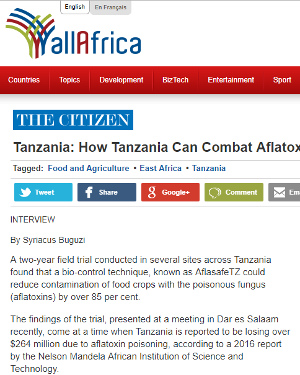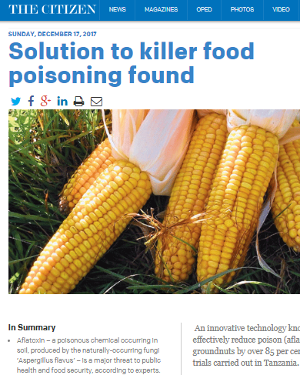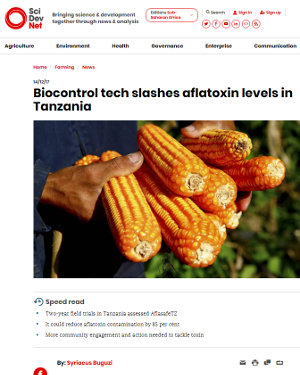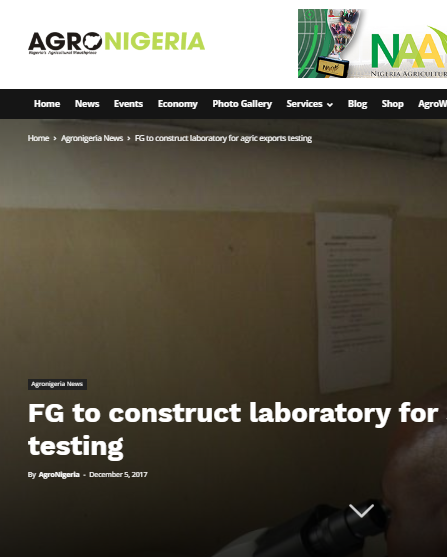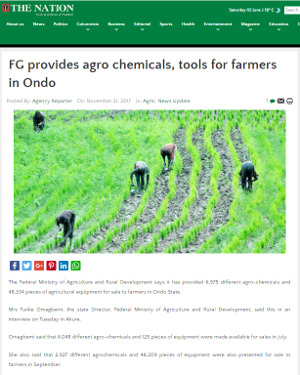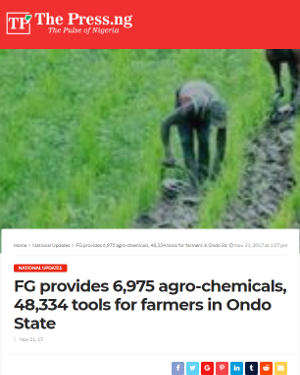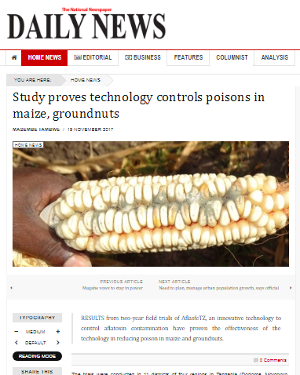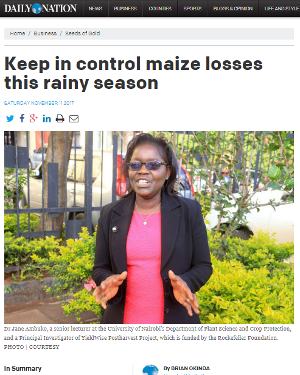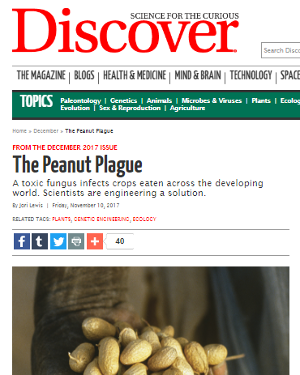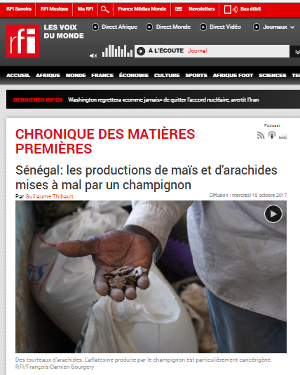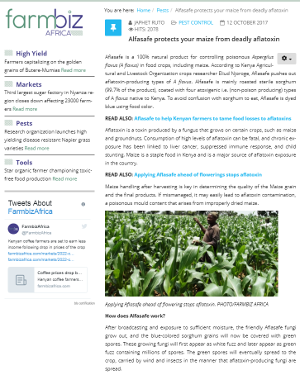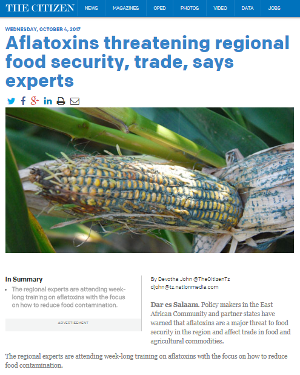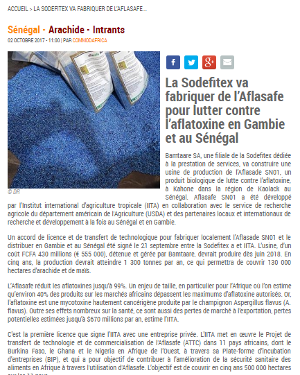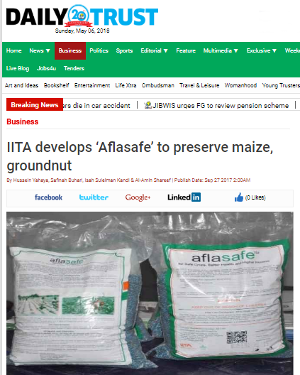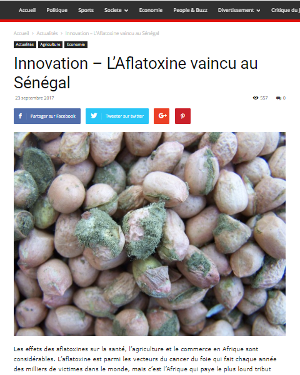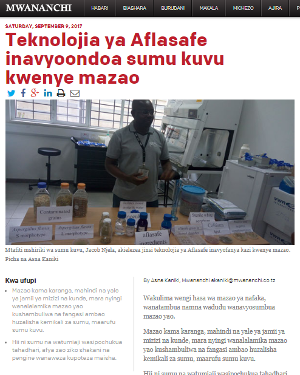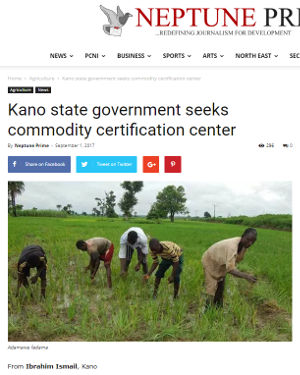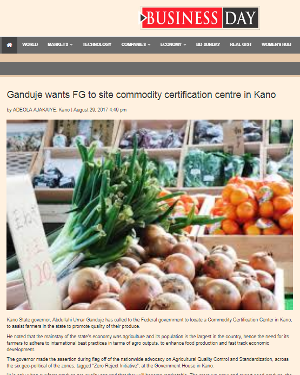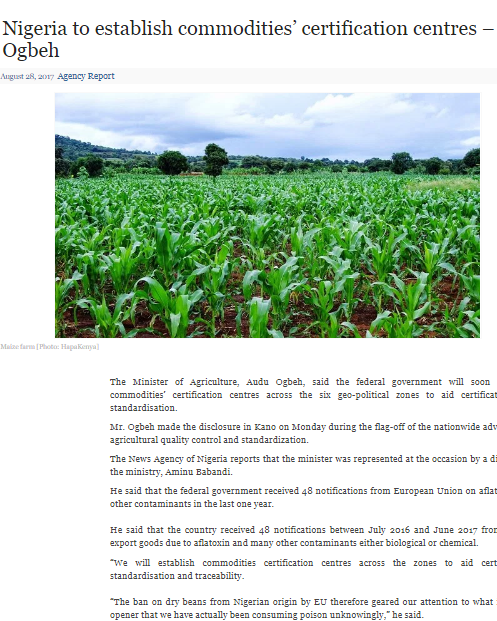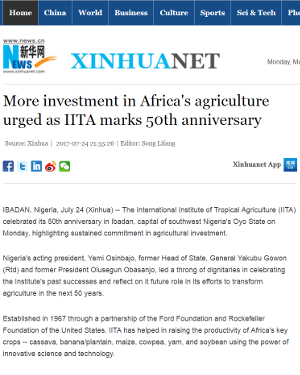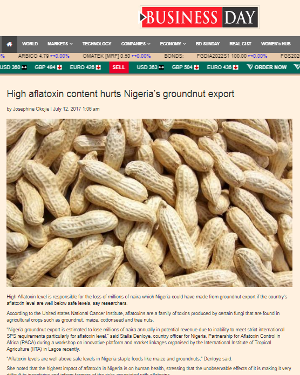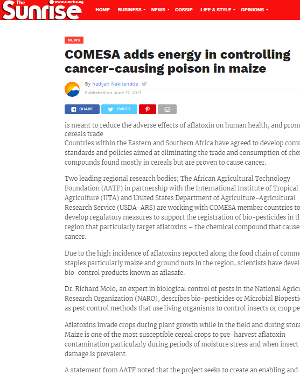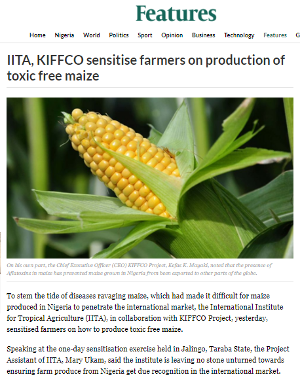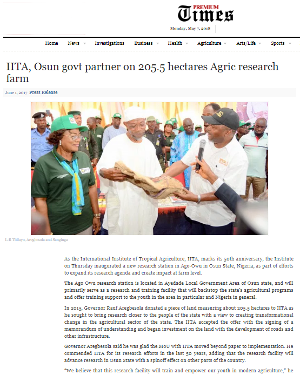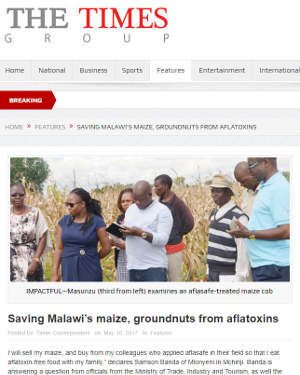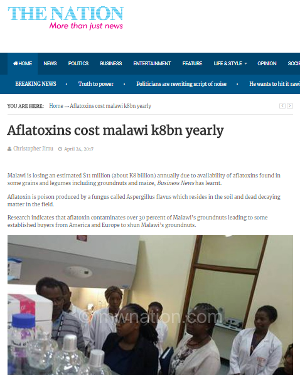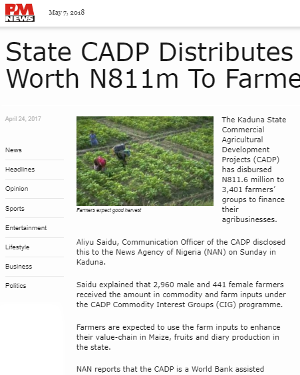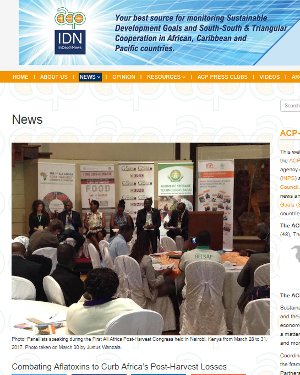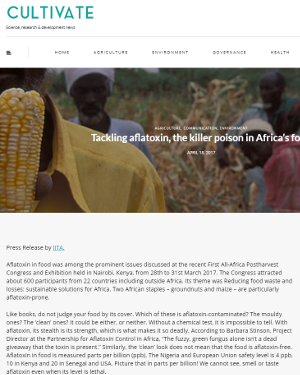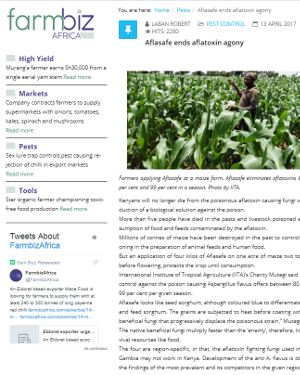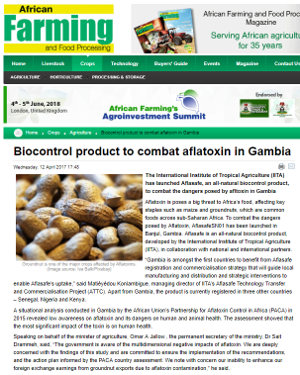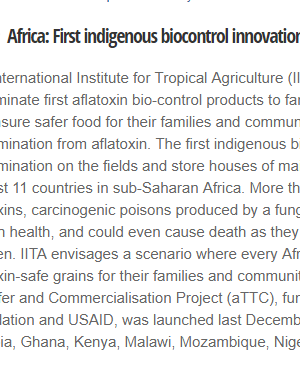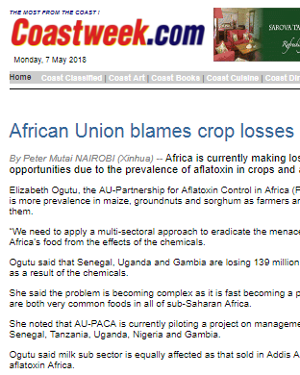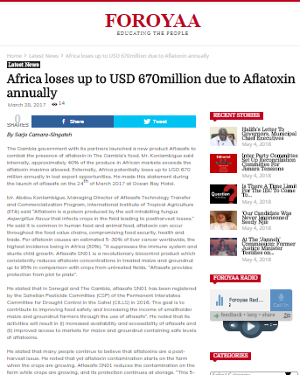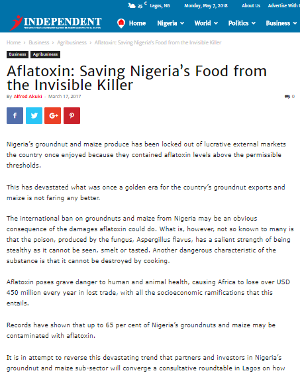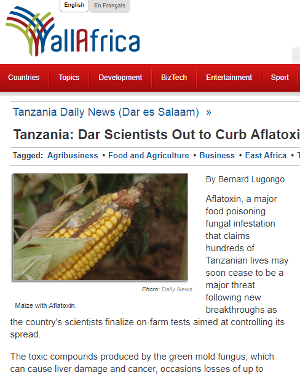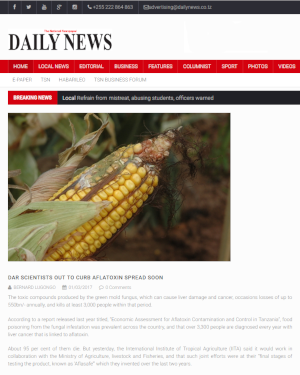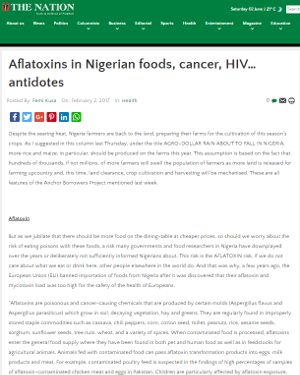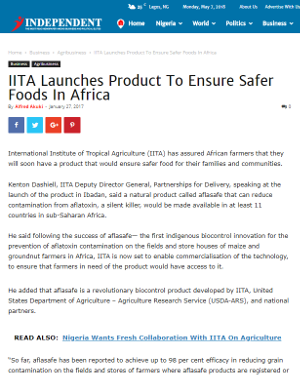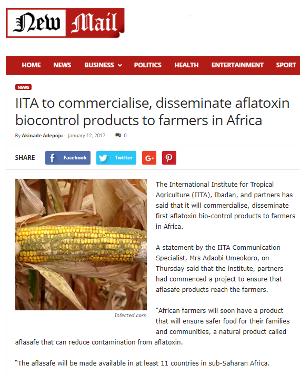Warning: Undefined variable $typesql in /home/aflasafe/public_html/wp-content/themes/aflasafe/functions.php on line 995
Wondering what people are saying about Aflasafe? Here you will find some of Aflasafe’s appearances in the media, plus selected news items from the wider world of aflatoxin. We’re still adding to this page, but if you’ve spotted a mention do let us know.
If you’re from the media, we’d love to here from you at media@aflasafe.com, and for you to check out our own press releases and latest news.
November 2019
Several well-known brands of maize flour have been taken off supermarket shelves in Kenya, after a warning about unsafe levels of a poisonous substance known as aflatoxin. This has led to widespread concern, as maize is the country's main staple...
Maize meal is a staple food in Kenya. There are some people who cannot go a day or two without eating Ugali. Recently, the Kenya Bureau of Standards announced some brands of maizemeal that had a high level of aflatoxin. How long have Kenyans consumed these brands unknowingly?
The government has put on notice millers of the five maize brands linked to aflatoxin contamination still selling the flour in the country's markets. Agriculture CS Mwangi Kiunjuri said the ministry is aware that some millers of the listed maize flour have resorted to lowering prices so as to clear their stocks...
Johannesburg - Seven brands of Kenyan peanut butter have been banned in Rwanda, and suspended in Uganda, after the Kenya Bureau of Standards (Kebs) suspended the brands last week and instructed the manufacturers to discontinue production and recall stock...
Kitui Flour Mills is demanding that the Kenya Bureau of Standards makes public the findings of its test on the Dola Maize brand that has been found to have high aflatoxin levels...
For decades, the country has experienced severe grain shortages, especially maize, for human consumption and for animal feeds. The demand for maize has created an avenue for the government to allow maize imports into the country. But, lurking beneath this staple, is a poison so unpredictable, chances are you have consumed it...
Tanzania has been successful in developing a biocontrol product known as Aflasafe TZ01, which is already registered for commercial use in the country. A private company is investing in a manufacturing plant and is organising marketing and the distribution of the life-saving product...
August 2019
Techiman, (BE/R), Aug. 21, GNA - “There isn’t time to wait to solve the problems that aflatoxin creates, because it is already impacting the health and well-being of 4.5 billion people across the globe”...
Githunguri Dairy Assistant General Manager Fredrick Mureithi says an increase in the number of milk processors, devolution and adoption of new technologies have helped stabilize the supply of dairy products in Kenya...
The GSA National Aflatoxin Sensitisation and Management (NASAM) project says, it is working to translate materials developed on aflatoxin into seven major languages to enhance farmers’ understanding of the problem...
Confusion has continued to present itself in the family of late Kibra MP Ken Okoth on whether or not to perform burial rituals as reported by newspapers on Tuesday, August 6. The dailies also reported on the division of revenue standoff between the national and county governments...
According to a video circulating online, the ravaging cancer menace in the country might have been foreseen by former Kenya Bureau of Standards (KEBS) boss, the late Kioko Mang'eli, in 2011. Appearing before the National Assembly Committee on Agriculture at the time...
The number of cancer cases have been on the rise in Kenya with the country recording 47,887 new cases of all types of cancer and 32,987 deaths from all types of cancer combined. This is according to the National Cancer Institute...
July 2019
Processors of groundnuts are increasingly resorting to imports due to high levels of aflatoxin in the local crop, making it unsafe. For instance, the Equatorial Nut Processor is importing nuts from Malawi and Uganda with low levels of the fungal toxins...
Men who consume high contents of aflatoxin in maize, sorghum, millet and groundnuts have high risk of male sterility and liver cancers, says Professor Richard Tuyee Awuah, of the Kwame Nkrumah University of Science and Technology (KNUST)...
The death of Bomet Governor Joyce Laboso should serve as a wake-up call for Kenyans. Dr Laboso’s death, caused by cancer, came only days after that of Kibra MP Ken Okoth who also succumbed to cancer...
Up to 124,486 bags of maize held by the State in the Strategic Food Reserve (SFR) are contaminated with aflatoxin at a time when the country is contemplating import of the grain to plug a biting shortfall...
BELGIUM Ambassador to Tanzania Peter Van Acker has commended the International Institute of Tropical Agriculture (IITA) in Tanzania for innovation of bio-control product technology—‘aflasafe’ to address toxic chemicals in crops that can cause cancer and suppress body immune...
Accra, July 5, GNA - Dr Rose Omari, Project Coordinator of the National Policy and Technical Regulation for Aflatoxin says there were processes if adhered to by actors in crop production could control high levels of aflatoxins in food. She stated that aflatoxin contamination could occur both at pre and post-harvest stages of crops production...
The Middle Zone Women Farmers in Ghana have urged government to subsidise Aflasafe, a technology developed to help reduce high rates of aflatoxins in cereals...
Accra, July 3, GNA - The Middle Zone Women Farmers in Ghana have urged government to subsidise Aflasafe, a technology developed to help reduce high rates of aflatoxins in cereals...
June 2019
The International Institute for Tropical Agriculture (IITA) and the Federal Ministry of Agriculture and Rural Development has advised maize and groundnut farmers to use Aflasafe technology to control aflatoxin. Aflasafe is a biological control product designed to effectively reduce Aflatoxin in the field...
The Nigerian Export Promotion Council (NEPC) has trained over 100 local producers in the South-South geopolitical zone on ways to produce quality and hygienic products free from Aflatoxin and Mycotoxin contaminants...
THE International Institute of Tropical Agriculture (IITA) and Harvest Field industries on Monday sensitised farmers on Aflasafe which is a chemical used to control aflatoxin which contaminates Maize and groundnut while in the farm...
Standard Chartered Bank Ghana Limited and the Ghana Commodity Exchange (GCX) signed an MOU to support Ghanaian farmers through access to financing and capacity building. The signing ceremony took place at the premises of the Ghana Commodity Exchange (GCX) in Accra...
THE Tanzania Food and Drugs Authority (TFDA) has called for potential mitigation measures to control food contamination from aflatoxins since the poison has so far affected the health and lives of people in Tanzania, Kenya and some other parts of the world...
The Anglican Church of Kenya has been tackling the issue of food security through its development wing, the Anglican Development Services (ADS). Food waste is a real problem in Kenya. According to the Kenya National Bureau of Statistics, growers lost over 1.9 million tonnes of food in 2017...
Between living a lonely life under heaps of books and in research labs and having to deal with nerve-wracking supervisors, pursuing a Ph.D. has never been a walk in the park...
There is no doubt that the impacts of climate change are beginning to manifest on the entire globe and particularly on developing countries that are relatively vulnerable. Climate change, is an economic reality and a growing risk that businesses and investors are learning to address...
NAIROBI, June 7 (Xinhua) -- A Kenyan health offical on Friday blamed industry-produced trans-fats, aflatoxin and presence of pesticide residues for low-quality of food products. Sicily Kariuki, cabinet secretary of the Ministry of Health, said the presence of veterinary drug residues and food adulteration are also a concern to the government...
The government has expressed concern over the presence of pesticide residue in fruits and vegetables. This is attributed to the misuse of pesticides and other agricultural inputs. As the world marks Food Safety Day on Friday...
Two federal agencies in the United States are part of efforts to find the source of food poisoning in Uganda that led to four deaths. The U.S Centers for Disease Control and Prevention and Food and Drug Administration are involved in the investigation of the outbreak that occurred in March and April...
A number of women farmers and value chain actors from Zuarungu in the newly-created Bolgatanga East District and other communities in the Bolgatanga Municipality in the Upper East Region have been sensitised to the dangers of high level of aflatoxins in agriculture...
Key agriculture stakeholders in Uganda have moved to support national efforts towards addressing food and nutrition insecurity as well as increasing national income through strategies to reduce post-harvest losses in grains...
Sunyani, June 3, GNA - The public has been cautioned on the presence of aflatoxins in food crops that could cause cancer in humans and animals. Mr Derry Dontoh, Head of Mycotoxins and Histamine laboratory of the Ghana Standards Authority was speaking at a day’s sensitisation programme...
Farmers under the aegis of Maize Association of Nigeria (MAAN) have appealed to President Muhammadu Buhari to critically look into their major concerns in his second term in office...
May 2019
The Ghana Standards Authority (GSA) has extended its sensitisation campaign to disseminate information on aflatoxins to stakeholders in Techiman in the Bono East District...
You can’t see or smell them, but aflatoxins are one of the world’s most carcinogenic substances. They are produced by a group of molds known as the Aspergillus fungi that often contaminate grains, such as maize. Aflatoxin-contaminated food can increase the risk of cancer and is associated with childhood stunting...
The Maize Association of Nigeria (MAAN), has disclosed that government’s intervention in the agricultural sector has increased their yields from eight million MT in 2015 to 20 million MT in 2018, hence the importation of Maize will not be needed...
The Ghana Standards Authority (GSA) has engaged farmer-based organisations (FBOs) in the Kumbungu district of the Northern Region on the dangers associated with aflatoxin in grains...
Kampala- Tests carried out on patients and food (super cereals) samples distributed by the World Food Programme (WFP) found traces of yeast, mould, bacterial contamination and the potential cancer causing aflatoxin, according to preliminary findings..
The Mexican Government is partnering with the Ghana Standard Authority (GSA) to introduce Nixtamalisation technology in Ghana to reduce levels of aflatoxin in maize. The technology is an ancient Mexican skill for processing white corn...
Accra, May 28, GNA – The Ghana Standards Authority (GSA) in efforts to combat the aflatoxin problem has embarked on a sensitisation campaign to disseminate information on aflatoxins and provide solutions under the National Aflatoxin and Sensitisation Management (NASAM) Project...
The Ghana Standard Authority (GSA) has organised a sensitisation workshop to educate the public on aflatoxin infection and its management. Aflatoxins are fungus that contaminates food commodities such as maize, groundnut, chilli pepper, rice among other crops...
The Federal Government earned about N1.3 billion from concession of about 19 Grain Reserves Silo Complex to the private sector. Besides, it would also earn about N10.4 billion from the concessionaires, as they are expected to pay as yearly concession fee of N3.4 billion and another N6billion as share of profit...
Kenya Bureau of Standards plans to set up a laboratory in Nyeri to test aflatoxin. Rowland Ogembo, the KEBS officer in charge of Meru office, said Nyeri is a maize growing and animal feeds production region, which necessitates quality checks...
Conquering a nut pollutant means lives and livelihoods saved in the process. If you’re at all tapped into coastal trends or certain kinds of celebrity-promoted wellness, then you’re likely familiar with the need to rid your body (and your life) of toxins...
NTA News bulletin on rejection of maize exports due to aflatoxin contamination and how Aflasafe can prevent it. (Video via Musa Baba Aliyu/YouTube)
The Federal Ministry of Agriculture and Rural Development (FMARD) has announced the concessions of 20 silos to private investors will bump Nigeria’s annual revenue up by N6 billion. The concession of the government grain houses is an actualisation of the Public-Private Partnership (PPP) on Silo program...
ABUJA – The Federal Government would earn about N9.4 billion as annual concession fee from seven companies it has concessioned 19 Grain Reserves Silos Complexes in the country. These companies are expected to pay an annual concession fee of N3.4billion and another N6billion as profit share...
The Nigerian Cabinet has approved the sum of N9.7 billion for the purchase of grains for storage in silos across the country. Minister of Agriculture and Natural Resources, Audu Ogbe disclosed this while briefing State House Correspondents on the outcome of this week’s Cabinet meeting presided over by President Muhammadu Buhari...
Public education and multi-sectoral approaches are needed to combat aflatoxin in Africa, argues Boaz Keizire. That food insecurity in Africa is worsening has been receiving more attention, and climate change is often viewed as the main culprit...
ABUJA-THE Federal Government on Wednesday said that the country has saved $21 billion on imports in the last three and half years. The Minister of Agriculture and Natural Resources, Chief Audu Ogbe disclosed this while briefing State House Correspondents after the weekly Federal Executive Council, FEC, meeting...
Next Frontier feature from KTN News’ Business Today on fighting aflatoxin using Aflasafe. (Video via YouTube)
Efforts are now underway to commercialise local production and distribution of the solution “to efficiently and rapidly reach all corners of Tanzania,”...
Scientific trials against aflatoxin, a carcinogenic fungus found in food crops notably maize, have proved successful in Tanzania. Trials carried on maize fields in Morogoro, Dodomo, Manyara and Mtwara regions indicated that the toxin can be tamed through the application of Aflasafe, a natural solution of four fungal strains...
NTV Business report for Food Friday on how Aflasafe KE01 is helping Kenya win the war on aflatoxin. (Video via YouTube)
KIWANDA cha A to Z cha jijini hapa kimeingia mkataba wa bilioni 3.5 wa kuzalisha dawa aina ya AFLASAFE ya kutibia mazao yanayosababisha sumukuvu inayopatikana kwenye mahindi na karanga na ambayo imekuwa ikisababisha maradhi ya saratani ya ini...
There are many different types of moulds and fungus which can grow in food, including various species of mycotoxins; but aflatoxin has gained attention more than most others, because studies have found clear evidence of its potential for causing carcinogenic effects...
The Ghana Federation of Agricultural Producers (GFAP), has raised concerns over the high levels of aflatoxin-poison in agriculture produce...
April 2019
Aflasafe modular manufacturing plant in Machakos County completed. This video was brought to you in conjunction with President's Delivery Unit, under Uhuru Kenyatta's Big 4 Agenda. (Video via YouTube)
It is said that food is medicine and in Ghana, food is one thing that brings people together no matter the circumstances. This implies that crops must be produced to meet standards for consumption and export, but one major setback for the production of some food crops in Ghana is the aflatoxin infestation...
TUMU (UWR), April 23, GNA - Farmers in the Sissala East Municipality have been introduced to new variety of groundnut seeds, which agricultural scientists describe as high yielding and resistant to aflatoxins...
Aflatoxin remains one of the major challenges facing farmers and consumers in the country, with more than 70 percent of Kenyans said to be getting exposed to this menace...
Recent withdrawal from the shelves of some brands of peanut butter products because they contained more than the maximum tolerance of aflatoxin (10ppb/micrograms per kilo of butter) dealt a devastating blow to the manufacturer...
More than 70 per cent of Kenyans are chronically exposed to aflatoxin, a trend agriculture researchers fear is contributing to the increasing health bill and food insecurity...
Nyankpala (N/R), April 14, GNA – The Ghana Standards Authority (GSA) has sensitised farmers and other stakeholders in the agricultural sector in the Northern, North East and Savannah regions on the causes and effects of aflatoxin, and how to reduce its contamination of grains...
Malawi is annually losing K64 billion in exports due to Aflatoxin contaminated groundnuts and maize, a development that the United States government has described as unacceptable for a country that want to move from a net importer to exporter...
The Ghana Standards Authority (GSA) has engaged smallholder farmers, downstream consumers and top value chain actors in the Upper West Region on ways of cutting down aflatoxin contamination in grains...
The American government, through its embassy in Malawi, has given the government of Malawi an Aflatoxin Testing Laboratory to enable farmers to control aflatoxins in the groundnuts and maize crop...
“Our beloved country, is free forever.” These words, spoken by our first President Dr. Kwame Nkrumah at the dawn of our independence, have echoed in the hearts of every Ghanaian for the sixty-two years that we have been a free and independent state...
The Ghana Standards Authority (GSA), together with its partners, has launched the National Aflatoxin Sensitisation and Management (NASAM) Project at the University of Development Studies (UDS), Navrongo Campus in the Upper East Region...
The Kenya Bureau of Standards (Kebs) on Friday announced it had cleared Nuteez peanut butter to return to the market, two months after the product was declared unfit for human consumption. The peanut butter was recalled from the market in January after it was found to contain high levels of cancer-causing aflatoxins...
The National Aflatoxin Sensitisation and Management (NASAM) Project, a special-purpose entity within the Ghana Standards Authority (GSA), has organised its maiden public engagement, a media training workshop in Accra.
This forms part of activities covered under a two-year project support grant awarded the Authority by The Alliance for Green Revolution in Africa (“AGRA”) for the NASAM Project.
Farmers in Tana River County are among the local producers who have lost billions of shillings after their crop was infected with aflatoxin...
KBC Channel 1, Kenya: Maize farmers in arid areas urged to apply Aflasafe during the planting season
Video from KBC News Hour. Maize farmers in arid and semi aid areas are being encouraged to apply Aflasafe during the planting season to protect their produce from aflatoxin contamination...
March 2019
O Ministério da Agricultura e Segurança Alimentar (MASA) diz que o nível de incidência da Lagarta do Funil do Milho (LFM) em Moçambique não é muito preocupante, mercê das medidas de controlo integrado adoptadas para fazer face à ameaça da praga...
“We need a holistic, comprehensive approach” to tackling aflatoxins, says Amare Ayalew. Aflatoxicity is just one of the foodborne illnesses, such as salmonella infection, that disproportionately affect Africa. Aflatoxin is a type of toxin caused by a fungus...
Three universities in Africa have secured funds from African Union Research Grants Programme to conduct studies on how to fight aflatoxin. The universities — Makerere in Uganda, University of Eduardo Mondlane in Mozambique and the University of Zambia—are leading the project...
The Program Manager of the Partnership for Aflatoxin Control in Africa (PACA) Dr. Amare Ayalew is appealing to African governments to strengthen agricultural systems that ensure that farmers grow crops that are free from Aflatoxin contamination...
Aflatoxins are natural poisons produced when certain mould species grow on foods. They are often detected during the pre-harvest, harvesting, handling, storage, processing and transport stages of the food value chain if conditions are favourable. Malawi loses an estimated K23 billion in rejected export trade annually...
Kenya is targeting to take over the Sh3.2 billion Pakistani tea imports market from India following a dispute between the two Asian countries that has seen tea from Mumbai blocked from accessing the neighbouring state...
February 2019
Kenya has protested against a price cap that the Iranian government has imposed on tea exports to the country, putting the Sh4 billion market at the centre of a diplomatic tiff with Tehran...
Prof. Austine Omoigberale, the President, Paediatric Association of Nigeria, has warned against over consumption of groundnut, saying it is contaminated with aflatoxin, a toxic fungi. Aflatoxin is a toxin produced by some molds in crops, especially peanuts...
While pig producers in many African countries are scaling up their businesses from backyard to commercial enterprises, many are finding high feed costs are prohibiting their progress. In Ghana, government support, training and research are combining to resolve the impasse...
Recent reports of aflatoxin contaminated peanut butter products are of major concern as they relate to how the issue of product quality is addressed by manufacturers in the country. While regulatory authorities have acted to remove the contaminated products from the market, recalls are only the first step in addressing this issue...
One’s misfortune can indeed turn out to be another’s fortune. A homemade peanut butter brand is reaping from the misfortune of renown brands that have been suspended due to high aflatoxin levels...
The Kenya Bureau of Standards (Kebs) has suspended permits of two more firms whose peanut butter brands have also been found to have exceeded the maximum aflatoxin content, alongside ordering the recall of Jetlak Foods Limited’s Nuteez product...
When the Meru County government conducted a survey between 2016 and 2017 to establish the level of aflatoxin in maize in four sub-counties, the results shocked officials. Eighty-two per cent of the samples had higher levels of aflatoxin than recommended...
NAIROBI, Kenya, Feb 4 – Kenya Bureau of Standards (KEBS) has withdrawn the permits of Triclover and Mother nature’s after their peanut butter products were found to exceeded aflatoxin levels...
Food company Jetlak Food Limited, makers of Nuteez Peanut butter, has pulled out the product from shelves in Kenya and Uganda...
The Nuteez peanut butter brand, which has been recalled from supermarket shelves for contamination with cancer-causing aflatoxin, is now blaming distribution chains for the problem...
The U.S. government in partnership with the International Institute of Tropical Agriculture (IITA), has announced the availability of AflasafeTZ, an effective technology to reduce aflatoxin contamination in human food and animal feed...
January 2019
Your favourite spread of peanut butter could be poisonous. The government, through the Interior Ministry has issued a warning that a popular brand of peanut butter is not fit for human consumption...
Nuteez peanut butter has been declared not fit for human consumption. In a certificate of analysis on Thursday, the government chemist said it exceeds the maximum required limit of aflatoxin...
A significant percentage of maize produce is rejected by agro-processing factories due to poor quality caused by high level of humidity due to poor post-harvest handling stage, Business Times has learnt. The main problem preventing maize farmers from accessing stable markets include “aflatoxins”...
Aflatoxins are a group of toxic chemicals produced by fungi, mostly Aspergillus flavus and Aspergillus parasiticus. There are four major types, namely aflatoxin B1, B2, G1 and G2. They are originally known for their cancer causing ability, but have recently also been associated with malnutrition...
The African Union Commission has awarded the University of Zambia (UNZA) a grant contract worth K9,336,06.94 to research ”Diversity of Aspergillus species and aflatoxin contamination along maize and groundnut value chains in Eastern and Southern Africa”...
State agencies in Mombasa have started destroying contaminated maize imported from a southern African nation after it was declared unfit for human consumption last year. Some 201 40-foot containers of maize had been stored under tight security...
December 2018
12 December 2018. Ghana inaugurated the National Steering Committee for Aflatoxin Control. The Committee was established as part of the deliverables of a project titled:“Developing national policy and technical regulation for aflatoxin control in food and feed”...
Health experts have revealed that ingesting food contaminated by moulds can send one to an early grave. This is because these moulds produce a poisonous chemical formulation called Aflatoxins. About 30% of all Liver Cancer cases are caused by Aflatoxin ingestion...
The Minister of Science, Environment and Innovation, Professor Frimpong Boateng has inaugurated a 17-member National Steering Committee for Aflatoxin Control. At the inaugural ceremony on Wednesday December 12, 2018, the Minister said Children are susceptible to aflatoxin...
Accra, Dec. 12, GNA – Ghanaian children are susceptible to aflatoxin, a harmful toxin produced by fungi that are commonly found in cereals such as rice, maize, millet, and groundnut, which are staples often used to feed them...
TV discussion programme in Twi on aflatoxin and health with Dr Rose Omari (video via Facebook).
TV discussion programme on aflatoxins and food safety with Dr Rose Omari (video via Facebook).
November 2018
Africa’s over-reliance on external institutions is undermining the continent’s capacity to strengthen agricultural research and development for improving the livelihoods of millions of people...
When a country’s staple food moves into short supply, citizens go hungry, which has put maize at the heart of Kenyan policy and politics for decades: a centre-stage commodity that earns news space and the forever attention of legions of decision makers...
Research shows that 60 per cent of the maize, groundnuts, soya beans and sorghum sold on the market have high levels of aflatoxins (poisons) that damage the body systems leading to cancer, Paul Tajuba writes...
Fresh tests on maize already declared unfit for human consumption are raising eyebrows, with industry players alleging a cover-up plot by top government officials to have the maize back on Kenyan’s dinner tables...
Some 201 containers with maize declared unfit for human are lying at a container freight station in Mombasa. Directorate of Criminal Investigation officers from Nairobi yesterday visited Consolebase Ltd (FKF), which has been storing the maize for more than a year...
KAMPALA - Various stakeholders, including the agriculture ministry, have embarked on a sensitisation food safety drive against aflatoxins. Research groups from Makerere University and the African Union Commission are part of the campaign...
By CORRESPONDENT, MOMBASA, Kenya, Nov 15 – Some 202 containers containing maize contaminated with aflatoxin have been impounded at a Container Freight Station in Mombasa. The containers were imported into the country on September 22 last year...
Agricultural experts have raised the alarm over the outbreak of aflatoxins in agricultural produce in Nigeria, saying that if the disease is not tamed, it could fuel food crisis and security in Nigeria...
The Kenya Veterinary Association has warned the National Cereals and Produce Board against turning contaminated maize in their silos into animal feed. The vet association said the 750,000 bags of contaminated maize in the country had high levels of aflatoxins...
Animal feed manufacturers have opposed blanket release of contaminated maize held in government siloes, saying it could hurt their local market share and across East Africa...
MUKOTHIMA, Kenya, Nov 2 (Thomson Reuters Foundation) - For a farmer who has repeatedly suffered poor harvests due to inadequate rains, Silas Kirimi was surprised to find himself with the opposite problem this year: What to do with last season’s bumper harvest of green gram?...
October 2018
KAMPALA. The ministry of Agriculture and Makerere University have warned of rising cases of crops being contaminated with poisonous fungi or moulds. The two institutions also issued guidelines on handling crops...
Eleven undergraduate students from Sokoine University of Agriculture (SUA), Tanzania, spent five weeks at the International Institute of Tropical Agriculture (IITA) Eastern Africa hub office in Dar es Salaam, as part of their field practical experience...
Jimoh Babatunde writes on the recent move by AUC to tackle the challenges of aflatoxin as stakeholders gathered in Dakar, Senegal for the 3rd Partnership for Aflatoxin Control in Africa (PACA) Partnership Platform Meeting (PPM) recently...
Radio broadcast on aflatoxin in Africa, discussing Aflasafe in Tanzania from c. 33:45: Aflatoxins pose a threat to food security, public health, as well as trade in Africa; and the need for its control can never be overemphasized! PACA is a collaboration of stakeholders aimed at protecting crops, livestock and people from the effects of Aflatoxins...
Africa holds considerable potential in terms of agriculture and economics, given that a quarter of the human global population will reside there by 2050. But can it feed itself?...
The head of the African Union Commission (AUC) has urged countries in the region to tackle the impact of aflatoxins. Moussa Faki Mahamat made the comments at the opening of the third Partnership for Aflatoxin Control in Africa (PACA) Partnership Platform Meeting (PPM) in Senegal earlier this month...
Aflatoxins are toxic and carcinogenic substances produced by certain fungi which commonly contaminate a wide range of staple food and cash crops in Africa and other tropical and sub-tropical regions...
The Government of Tanzania has been selected for the African Union (AU) Award 2018 as an Agent of Change for Aflatoxin Control in Africa by the Third Partnership for Aflatoxin Control in Africa (PACA)...
Sénégal n’entend pas laisser prospérer la menace causée par l’aflatoxine. L’État a annoncé sa volonté de fabriquer prochainement, ‘’une unité de production d’un produit dénommé ‘’Aflasafe sn01’’ au Sénégal à même de réduire drastiquement les méfaits de cette substance sur nos cultures. ..
Au Sénégal, la filière arachidière est aujourd’hui exposée aux méfaits de l’aflatoxine qui est une substance toxique secrétée par un champignon du genre Aspegillus flavus. Ces toxines contaminent certaines cultures comme l’arachide, le maïs et le riz et ont des impacts aussi bien sur la santé que sur l’économie nationale...
Vice-President, Dr Mahamudu Bawumia will on Wednesday open the 2018 Pre-Harvest exhibition and conference, which seeks to accelerate the transformation of agribusiness in Northern Ghana at Tamale in the Northern Region...
Africa is said to lose about $700 million to Aflatoxin, which commonly contaminate a wide range of stable food and cash crop in the continent...
September 2018
It is not uncommon to see a photo of a hungry, malnourished child. The images are always striking while eerily similar; visibly malnourished, emaciated, disappearing frames with death in their eyes. This is the face of world hunger, and Nigeria has millions of these faces—victims of starvation and food insecurity...
Pour lutter contre un champignon qui infecte les graines, libérant ainsi une substance cancérigène, un nouveau fongicide a été créé pour détoxifier les tourteaux d’arachides...
L’aflatoxine est un poison produit par les champignons. On le trouve dans le sol. Cette maladie affecte les cultures dans les champs. Elle entraîne des pertes de récoltes et des pertes en vies humaines et animales en cas de consommation des grains affectés...
Being able to accept the 2018 Africa Food Prize today on behalf of the International Institute of Tropical Agriculture (IITA) comes with immense pride...
The government in collaboration with food researchers is in the process of setting up a plant for production and distribution of ‘Aflasafe’ a product meant to control poison in food...
Taasisi ya Kimataifa ya Kilimo cha Kitropiko (IITA), ina mkakati wa kuanza kuzalisha dawa aina ya Aflasafe ya kuuwa wadudu wanaotokana na mazao ya nafaka, ikiwemo mahindi na karanga ili kuepukana na gharama za kuagiza nje ya nchi...
International Institute of Tropical Agriculture (IITA) Director-Eastern Africa Hub, Dr Victor Manyong, speaks to journalists during an Aflasafe products and manufacturing stakeholders' forum to discuss how to reduce the contamination of food and feeds by aflatoxins in Dar es Salaam yesterday.
Tanzania will make headway in battle against cancer-causing aflatoxins as stakeholders meet to plan commercialisation of effective, all-natural control technology—Aflasafe TZ...
Tanzania will soon join other African countries in rolling out new technology that will contain cancer-causing aflatoxins. Known as Aflasafe TZ, the technology can reduce the poisonous chemical's contamination in food by 80 to 90 per cent...
Video coverage in Kiswahili and English.
Television news coverage of Aflasafe Investor Forum, in Kiswahili. Broadcast 8pm, 3 September 2018.
Video news item. Katika juhudi za kuhakikisha kua na chakula salama kwa matumizi ya ndani na kufikia kiwango hitajika cha usafirishaji wa mazao nje ya nchi taasisi ya kimataifa ya utafiti wa kilimo cha kitropiki (IITA) wamekutana na wadau mbalimbali wa kilimo Jijini Dar es Salaam...
August 2018
Arusha. Stringent standards by the European Union (EU) have led to Africa losing a staggering $670 million annually in exports doe to aflatoxin-contaminated food exports...
Repost of video of Aflasafe GH02 launch keynote address, ‘Aflatoxin control: Whose responsibility?’
On June 29, 2018, A4NH researchers with the International Institute of Tropical Agriculture (IITA) were joined by government officials, members of the private sector, and others to formally launch Aflasafe GH02™, a Ghana-specific version of the all-natural product developed by IITA to fight aflatoxins in crops throughout Africa...
On June 29, 2018, A4NH researchers with the International Institute of Tropical Agriculture (IITA) were joined by government officials, members of the private sector, and others to formally launch Aflasafe GH02™, a Ghana-specific version of the all-natural product developed by IITA to fight aflatoxins in crops throughout Africa...
July 2018
About a month ago, I felt the need to take a breather from the chaos that can be Lagos and go on a solo road trip through Oyo state. With luck, I was able to book a room at IITA, the International Institute of Tropical Agriculture...
Aflatoxin in food is a 44-year-old problem in Ghana. Aflatoxin is furtive – a hidden and silent killer. Aflasafe GH02 reduces aflatoxin by up to 100%...
To reduce the amount of aflatoxin in some red pepper products, the Ministry of Agriculture and Livestock Resources is planning to apply Aflasafe by the middle of next year. The technology will come from Nigerian laboratories...
With the official launch of Aflasafe GH02 in Accra, Ghana joins the growing list of countries in Africa actively combating aflatoxin in food. Aflasafe GH02 is an environmentally friendly all-natural solution to the scourge of aflatoxin, formulated from four friendly fungi, all from Ghana...
Aflatoxin in food is a 44-year-old problem in Ghana. Aflatoxin is furtive – a hidden and silent killer. Aflasafe GH02 reduces aflatoxin by up to 100%. With the official launch of Aflasafe GH02 in Accra today, Ghana joins the growing list of countries in Africa actively combating aflatoxin in food...
Today, Aflasafe BF01 was officially launched in Burkina Faso to fight aflatoxin in the country's food. Aflatoxin is a real and present danger - but tests have shown that Aflasafe BF01, the product specially tailored for Burkina Faso, reduces aflatoxin in maize and groundnuts by about 96% at harvest time...
Aflatoxin in food is a 44-year-old problem in Ghana. Aflatoxin is furtive – a hidden and silent killer. Aflasafe GH02 reduces aflatoxin by up to 100%. With the official launch of Aflasafe GH02 in Accra today, Ghana joins the growing list of countries in Africa actively combating aflatoxin in food...
June 2018
Accra, June 30, GNA – Aflasafe GH02, a new agricultural bio control product to help manage aflatoxin contamination in crops and poultry was launched in Accra to ensure food security and food safety in Africa including Ghana...
Radio news bulletin on the launch of Aflasafe GH02. Broadcast at 5:45pm, 29th Jun 2018.
Primetime TV news bulletin on the launch of Aflasafe GH02. Broadcast during the 7pm Evening News, 29 June 2018.
Le Burkina Faso pourra bientôt dire adieu aux aflatoxines, du nom de ces champignons poisons très résistants qui attaquent l’arachide, le maïs, le riz ou le sorgho. Le produit dénommé « Aflasafe BF01 » a été développé pour prévenir et réduire considérablement les cas de contamination...
Aired on prime time news, Télévision Nationale du Burkina, on 26th June 2018, the day Aflasafe BF01 was officially launched. More: http://bit.ly/2vmRotE
Food, they say, is medicine. But can this be said for many Ghanaian foods that are consumed in large quantities every day? Key staple and cash crops such as maize and groundnuts are particularly vulnerable to aflatoxin contamination...
A factory to manufacture aflatoxin prevention product, Aflasafe, is now operational. The plant at the Kenya Agricultural and Livestock Research Organisation (Kalro) Katumani, Machakos County - the first of its kind in Kenya - will help combat food insecurity...
The government is set to roll out a drug to combat the poisonous Aflatoxin that contaminates farm products especially in the lower Eastern part of Kenya. The cabinet secretary for Agriculture, Mwangi Kiunjuri said that Kenya is now in a position...
Wizara ya kilimo imetoa hakikisho kuwa imeweka mikakati ya kutosha kukabiliana na kuoza kwa mahindi hasaa kutokana na athari ya Aflatoxin. Hakikisho hili limetolewa na waziri wa kilimo Mwangi Kiunjuri alipozindua dawa mpya ya kukabiliana na sumu hiyo ya kuvu.
May 2018
As maize starts to flower, farmers may avert poisonous fungus contamination by applying a biological control of aflatoxins, aflasafe. Aflasafe is sold at between Sh1,240 and Sh2,070 for every 10kg pack in certified agro-vets depending on the country. A 2.5kg pack is also available...
April 2018
President of Harvestfield Industries Limited, Martins Aderemi Awofisayo, an indigenous agro and healthcare company recently signed-in by the International Institute of Tropical Agriculture (IITA), Ibadan, for the manufacture and distribution of Aflasafe...
The AgResult Aflasafe Pilot Project of the International Institute of Tropical Agriculture (IITA), Ibadan, on Thursday began the training of maize farmers on the use of Aflasafe control and strategies to ensure stability in business...
Nigeria has taken a giant stride in the fight against Aflatoxins in food. Aflatoxins are toxins produced by certain fungi that are found on agric crops, such as maize (corn), peanuts, cotton seed, and tree nuts...
The AgResults Aflasafe Pilot Project of the International Institute of Tropical Agriculture (IITA), Ibadan, has commenced the training of maize farmers on the use of aflasafe control and strategies to promote stability in the production of the crop...
The International Institute for Tropical Agriculture has said that maize farmers who use Aflasafe system in the production of the crop this year will benefit from an incentive package worth N500m. Aflasafe is a fungus-based biocontrol product developed by IITA and cuts aflatoxin levels in maize and groundnuts by 80 per cent to 100 per cent...
Studies have shown that consuming a handful of nuts a day can improve the quality of sperm in men, but eating nuts with aflatoxin can be fatal. Yes, groundnut, which contains zinc that helps improve sperm quality is also highly susceptible to aflatoxins...
March 2018
Soaking maize and other grains in food-grade lime can reduce levels of the micro-organism that causes aflatoxin in maize...
An indigenous agro-allied and healthcare company, Harvestfield Industries Limited, has pledged to return Nigeria to the days of the Kano groundnut pyramids...
The International Institute of Tropical Agriculture, developers of Aflasafe, has signed a Technology Transfer and Licensing Agreement with Harvestfield Industries Limited, Nigeria to manufacture and distribute Aflasafe in Nigeria...
The International Institute of Tropical Agriculture, developers of Aflasafe, has signed a Technology Transfer and Licensing Agreement with Harvestfield Industries Limited, Nigeria produce and distribute Aflasafe in Nigeria...
February 2018
Harvestfield Industries Limited has moved to curb aflatoxin in maize that forced regulators to confiscate grain and prevent its entrance into the market. Aflatoxins are poisonous and cancer-causing molds that can lead to stunting in children and severe health problems in adults...
The Cross River State Governor, Ben Ayade, says the state government set aside N500m for loans to assist Local Govt farmers, adding his government would work with officials of the Nigeria union of local government employees to facilitate access to the loan...
The International Institute of Tropical Agriculture (IITA)-developed crop protection and treatment product, AFLASAFE, is going commercial following the successes recorded on full field trials nationwide...
A firm, Harvestfield Industries Limited, has moved to curb aflatoxin in maize that forced regulators to confiscate grain and prevent its entrance into the market...
In the absence of concerted efforts to raise awareness on the dangers of aflatoxin to humans and domestic animals, advances in technology for early detection of aflatoxin in cereals and seeds such as maize will come to naught, experts warn...
Harvestfield Industries Limited says it has embarked on a nationwide farmers’ awareness programme on how to apply a new product on their crops for effective control of aflatoxin in maize and groundnuts...
BarzaWire, Farm Radio International: Spotlight: Farmers get answers fast by calling hotline (Malawi)
Like many farmers, Daudi Seleti has been troubled by the threat of aflatoxin. He heard on the radio that aflatoxin is hazardous to human health and wanted to know how to keep it out of his soybeans...
January 2018
Discussion of groundnut commercialisation. Aflatoxin and Aflasafe make their appearance at 11:47.
Eastern is likely to experience an aflatoxin outbreak, the Famine Early Warning Systems Network has said. A report released last week lists Kitui, Makueni, Tharaka Nithi, lower Meru and Embu as the areas likely to be affected...
KALRO names Makueni, Kitui, Tharaka Nithi, Lower Meru and Embu counties as highly susceptible to infestations due to inadequate on-farm storage...
The Partnership for Aflatoxin Control in Africa (PACA) has claimed that Nigeria loses about $155 million and 5,000 persons to liver cancer yearly, while Africa loses $670m to the scourge...
Abuja — The Partnership for Aflatoxin Control in Africa (PACA) has claimed that Nigeria loses about $155 million and 5,000 persons to liver cancer yearly, while Africa loses $670m to the scourge...
December 2017
Poultry fed with maize that had been treated with aflasafeTM – a biocontrol product for controlling aflatoxins – experienced reduced mortality in addition to other benefits, according to a new study by scientists from the International Institute of Tropical Agriculture (IITA) and the University of Ibadan...
The Ministry of Industry, Trade and Tourism says Malawi is losing about K64.1 billion ($86 million) annually due to the presence of aflatoxins in groundnuts. Quoting a report commissioned by the programme for Aflatoxin Control in Africa (Paca)…
The latest rise of AflasafeTZ to combat the deadly Aflatoxin fungi, is an indication that African agriculture is gradually emerging from its cesspit of viral and fungi challenges...
A two-year field trial conducted in several sites across Tanzania found that a bio-control technique, known as AflasafeTZ could reduce contamination of food crops with the poisonous fungus (aflatoxins) by over 85 per cent...
A two-year field trial conducted in several sites across Tanzania found that a bio-control technique, known as AflasafeTZ could reduce contamination of food crops with the poisonous fungus (aflatoxins) by over 85 per cent...
An innovative technology known as ‘Aflasafe’ can effectively reduce poison (aflatoxin) in maize and groundnuts by over 85 per cent, according to field trials carried out in Tanzania...
A biocontrol technology called AflasafeTZ could help control the deadly aflatoxin contamination in maize and groundnuts in Tanzania, scientists say. After a two-year field trial conducted in several sites across Tanzania, AflasafeTZ reduced contamination of food crops with the poisonous fungus...
The Federal Government is planning to set up a world-class laboratory for screening and testing agricultural produce before exportation to other countries. Upon establishment, the laboratory would limit incidences where export-target countries reject the country’s agriculture products due to spoilage...
November 2017
The Federal Ministry of Agriculture and Rural Development says it has provided 6,975 different agro-chemicals and 48,334 pieces of agricultural equipment for sale to farmers in Ondo State. Mrs Funke Omagbemi, the state Director, Federal Ministry of Agriculture and Rural Development...
The Federal Ministry of Agriculture and Rural Development says it has provided 6,975 different agro-chemicals and 48,334 pieces of agricultural equipment for sale to farmers in Ondo State. Mrs Funke Omagbemi, the state Director, Federal Ministry of Agriculture and Rural Development...
Results from two-year field trials of AflasafeTZ, an innovative technology to control aflatoxin contamination have proven the effectiveness of the technology in reducing poison in maize and groundnuts. The trials were conducted in 11 districts of four regions in Tanzania...
As maize farmers harvest their produce, a good chunk of the grain could be lost, especially due to the ongoing rains. Brian Okinda spoke to Dr Jane Ambuko, a senior lecturer at the University of Nairobi’s Department of Plant Science and Crop Protection...
A toxic fungus infects crops eaten across the developing world. Scientists are engineering a solution...
October 2017
Au Sénégal, les productions d’arachide et de mais sont attaquées chaque année par un champignon. Un champignon qui, s’il n’est pas traité, a des conséquences néfastes autant sur la santé que sur les exportations...
Aflasafe is a 100% natural product for controlling poisonous Aspergilus flavus (A flavus) in food crops, including maize. According to Kenya Agricultural and Livestock Organization crops researcher Eliud Njoroge, Aflasafe pushes out aflatoxin-producing types...
Dar es Salaam. Policy makers in the East African Community and partner states have warned that aflatoxins are a major threat to food security in the region and affect trade in food and agricultural commodities...
Bamtaare SA, une filiale de la Sodefitex dédiée à la prestation de services, va construire une usine de production de l’Aflasafe SN01, un produit biologique de lutte contre l’aflatoxine, à Kahone dans la région de Kaolack au Sénégal...
September 2017
An innovative product, Aflasafe, for use by maize and groundnut farmers has been developed by the International Institute of Tropical Agriculture (IITA)...
Les effets des aflatoxines sur la santé, l’agriculture et le commerce en Afrique sont considérables. L’aflatoxine est parmi les vecteurs du cancer du foie qui fait chaque année des milliers de victimes dans le monde, mais c’est l’Afrique qui paye le plus lourd tribut...
Wakulima wengi hasa wa mazao ya nafaka, wanatambua namna wadudu wanavyosumbua mazao yao. Mazao kama karanga, mahindi na yale ya jamii ya mizizi na kunde, mara nyingi wanalalamika mazao yao kushambuliwa na fangasi ambao huzalisha kemikali za sumu, maarufu sumu kuvu...
Kano State governor, Abdullahi Umar Ganduje, on Monday, appealed to the Federal government to locate a Commodities Certification Center in Kano, to assist farmers in the state to promote quality of their produce...
August 2017
Kano State governor, Abdullahi Umar Ganduje has called to the Federal government to locate a Commodity Certification Center in Kano, to assist farmers in the state to promote quality of their produce. He noted that the mainstay of the state’s economy was agriculture...
During the flag-off of the nationwide advocacy on agricultural quality control and standardisation on Monday, the Nigeria Minister of Agriculture, Audu Ogbeh, ably represented by a Director in the ministry, Aminu Babandi, has disclosed that commodities certification centres will soon be established in six geopolitical zones...
The Minister of Agriculture, Audu Ogbeh, said the federal government will soon establish commodities’ certification centres across the six geo-political zones to aid certification and standardisation...
July 2017
IBADAN, Nigeria, July 24 (Xinhua) -- The International Institute of Tropical Agriculture (IITA) celebrated its 50th anniversary in Ibadan, capital of southwest Nigeria's Oyo State on Monday, highlighting sustained commitment in agricultural investment...
High Aflatoxin level is responsible for the loss of millions of naira which Nigeria could have made from groundnut export if the country’s aflatoxin level are well below safe levels, say researchers. According to the United states National Cancer Institute, aflatoxins are a family of toxins produced by certain fungi...
June 2017
Countries within the Eastern and Southern Africa have agreed to develop common standards and policies aimed at eliminating the trade and consumption of chemical compounds found mostly in cereals but are proven to cause cancer...
To stem the tide of diseases ravaging maize, which had made it difficult for maize produced in Nigeria to penetrate the international market, the International Institute for Tropical Agriculture (IITA), in collaboration with KIFFCO Project, yesterday, sensitised farmers on how to produce toxic free maize...
As the International Institute of Tropical Agriculture, IITA, marks its 50th anniversary, the Institute on Thursday inaugurated a new research station in Ago-Owu in Osun State, Nigeria, as part of efforts to expand its research agenda and create impact at farm level...
May 2017
I will sell my maize, and buy from my colleagues who applied aflasafe in their field so that I eat aflatoxin-free food with my family,” declares Samson Banda of Mlonyeni in Mchinji. Banda is answering a question from officials from the Ministry of Trade, Industry and Tourism, as well the Partnership for Aflatoxin Control in Africa...
April 2017
Malawi is losing an estimated $11 million (about K8 billion) annually due to availability of aflatoxins found in some grains and legumes including groundnuts and maize, Business News has learnt. Aflatoxin is poison produced by a fungus called Aspergillus flavus which resides in the soil...
The Kaduna State Commercial Agricultural Development Projects (CADP) has disbursed N811.6 million to 3,401 farmers’ groups to finance their agribusinesses. Aliyu Saidu, Communication Officer of the CADP disclosed this to the News Agency of Nigeria (NAN) on Sunday in Kaduna...
NAIROBI (ACP-IDN) – Forty percent of the food produced in Africa is lost, largely due to poor product handling, storage and processing practices, with aflatoxins often responsible for much of this loss in the post-harvest phase...
Aflatoxin in food was among the prominent issues discussed at the recent First All-Africa Postharvest Congress and Exhibition held in Nairobi, Kenya, from 28th to 31st March 2017. The Congress attracted about 600 participants from 22 countries including outside Africa. Its theme was Reducing food waste and losses...
Kenyans will no longer die from the poisonous aflatoxin causing fungi with the introduction of a biological solution against the poison. More than five people have died in the pasts and livestock poisoned after the consumption of food and feeds contaminated by the aflatoxin. Millions of tonnes of maize have been destroyed...
The International Institute of Tropical Agriculture (IITA) has launched Aflasafe, an all-natural biocontrol product, to combat the dangers posed by aflatoxin in Gambia. Aflatoxin is poses a big threat to Africa’s food, affecting key staples such as maize and groundnuts...
The International Institute for Tropical Agriculture (IITA), Ibadan, and partners has said that it will commercialise, disseminate first aflatoxin bio-control products to farmers in Africa. African farmers will soon have a product that will ensure safer food for their families and communities...
Africa is currently making losses of up to 670 million U.S. dollars annually from export opportunities due to the prevalence of aflatoxin in crops and animal products, an African Union official said on Thursday...
March 2017
The Gambia government with its partners launched a new product Aflasafe to combat the presence of aflatoxin in The Gambia’s food. Mr. Konlambigue said internally, approximately 40% of the produce in African markets exceeds the aflatoxin maxima allowed...
The Food Security and Quality Authority (FSQA) in collaboration with the International Institute of Tropical Agriculture (IITA) over the weekend launched the Aflasafe SN01 in The Gambia, at a ceremony held at the Ocean Bay Hotel in Cape Point, Bakau...
Nigeria’s groundnut and maize produce has been locked out of lucrative external markets the country once enjoyed because they contained aflatoxin levels above the permissible thresholds. This has devastated what was once a golden era for the country’s groundnut exports...
Aflatoxin, a major food poisoning fungal infestation that claims hundreds of Tanzanian lives may soon cease to be a major threat following new breakthroughs as the country's scientists finalize on-farm tests aimed at controlling its spread...
The toxic compounds produced by the green mold fungus, which can cause liver damage and cancer, occasions losses of up to 550bn/- anually, and kills at least 3,000 people within that period...
February 2017
Despite the searing heat, Nigeria farmers are back to the land, preparing their farms for the cultivation of this season’s crops. As I suggested in this column last Thursday, under the title AGRO-DOLLAR RAIN ABOUT TO FALL IN NIGERIA, more rice and maize, in particular, should be produced...
January 2017
International Institute of Tropical Agriculture (IITA) has assured African farmers that they will soon have a product that would ensure safer food for their families and communities...
The International Institute for Tropical Agriculture (IITA), Ibadan, and partners has said that it will commercialise, disseminate first aflatoxin bio-control products to farmers in Africa...

